Welcome to Dr. Elzeiny Islamic Studies Class
1. This is a site for translation of the Holy Quran using easy English.
2. This is a site for Meaning of Quran in Pictures.
3.
Books about the Names of
Allah [Book 1] [Book 2] [Brief Meanings]
Choose for yourself. Where
would you like to live?






Table of Contents
Lesson [2]: The Knowledge of Allah.
Lesson [3]: The Name of Allah
Al-Wakeel (The One we depend on) Part 1
Lesson [4]: The Name of Allah
Al-Wakeel (The One we depend on) Part II
Lesson [5]: Sweet and Sour Mercy
Lesson [6]: Believe in The Unseen
World
Lesson [7]: Pillars of Faith - Believe
in Allah.
Lesson [8]: Pillars of Faith - Believe
in Angels.
Lesson [9]: Pillars of Faith - Believe
in the Books, the Prophets the Day of Judgment and the Qadar
Lesson [11]: Pillars of Islam – Zakah,
Fasting and Haj.
Lesson [13]: Reply
to "Muslims are terrorists and Islam is the religion of terror"
Lesson [14]: Reply to “Islam Spread by
the Sword”
Lesson [15]: Reply to “Sharia (Islamic
Law) is too Harsh”
Lesson [16]: Reply to “Sharia (Islamic
Law) is too old”
Lesson [17] Reply to Hijab Issues.
Lesson [19]: Reply to “Islam Allows
Men to have four wives - Women can’t be leaders”.
Lesson [20]: Reply to “Islam Allows
Slavery”
Lesson [21]: Reply to “Islam is not an
American Religion and Mohamed is not an American Name”
Lesson [24]: Why We are
being Tested - The Wisdom of Fitnah and Trials for The Believer.
Lesson [25]: Hadeeth of Intentions
Lesson [26]: Sunah and Bida’a
(Innovations) - Legal and Illegal Changes.
Lesson [27]: Enjoin Good and Forbid
Evil - Speaking Truth to Power.
Lesson []: The Hadeeth
Collections: Hadeeth of Intentions Part
I:
Lesson []: Doing Business with Allah
Lesson [] Lessons from COVID-19 Crisis
– By Sheikh Dr. Yasir Qadhi.
Lesson [] The American Dream – By
Sheikh Dr. Yasir Qadhi.
Lesson []: Modern Challenges – Speech
to the Muslim Youth by Dr. Yasir Qadhi.
Lesson []: 7 Wisdoms of pain and
suffering – Shaikh Dr. Yasir Qadhi
Lesson []: – The Day of Judgment [1]
(Lecture No. 1). By Shaikh Dr. Yasir Qadhi
Lesson
[1]: Our Enemies.

Click
here to listen to the class.
Homework:
[Part I]: If you have not done this
already, send me an email to hw@zeiny.net
telling me about yourself. What you want me to know about you. It is very
confidential. I will not share it with anyone. If you are using your parent’s
email, you may print it out and give to me in person. Please include a picture
of yourself in the email. You can take a selfie picture of yourself and email
it to me.
[Part II]: Listen
to the audio recording of the class or watch the video, read the notes and
answer the following questions thoroughly. Short answers are not accepted. You
must send me the homework via email hw@zeiny.net
1. Why did Allah create?
2.
Why didn’t he create
just angels and trees that will cause no corruption?
3.
Who are our four
enemies (evil motives)? Give examples.
4.
Why did Allah create
the Shytan and his other enemies?
5.
If there is no
meanness, would kindness exist? Explain why?
6.
Can we have a free
will if we don’t have evil motives? Give an example of a creation of Allah that
has no evil motives at all. Are they being tested?
7.
What are the tests of
submission? Explain and give examples.
8.
Temptations are evil
motives. Give five examples of evil temptations.
9.
After the Shytan starts the temptations, would he be able to make it
grow? Explain.
10.If
no one can avoid the startup of temptations in his/her heart, how can we fight
temptations then?
11.Mention
the story of the man who was transformed to a monster due to temptations.
12.What
are the good motives? Give couple of illustrative examples of each.
13.Why
does Allah allow evil, pain and suffering?
14.Why
did people worship middle Gods? Explain how worshiping middle Gods would cause
you to be taking disadvantage of.
15.When
Allah said to the bad guys to pay charity, what did they say? How can you
respond?
16.When
bad people are asked to give charity to the poor and needy, they reply and say that
we are not going to feed them. Allah is the one that should feed them not
us. How would you reply to this
argument?
Notes:






Lesson [2]: The Knowledge of Allah.


Click
here to watch the video recording of the class
Or Click here to listen to the
class.
Homework:
Listen to the
audio recording or watch the video recording of the class, read the notes
below, and answer the following questions thoroughly. Short answers are not
accepted. You must email me the homework via email hw@zeiny.net
Allah knows everything that happen and would happen in the
future. Allah guides whom so ever he wills and misguides whom so ever he wills.
Allah seals the ears of the bad guys so that they can’t hear the truth. Allah
blinds their eyes so that they can’t see the truth. Allah locked their hearts from
understanding the truth. Allah already wrote everything that will happen in a
book.
1. What is the ridiculous understanding of these statements?
2. How can I know your answer ahead of time without forcing you to
follow my answer? Explain using the example of cows who fly on their own.
3. What is the opposite of the statement "Allah guides whom so
ever he wants and misguides whomsoever he wants”? Prove that the opposite is
impossible.
4. Can good exist without evil? Explain why?
5. Can good deeds exist without bad deeds? Explain why?
6. Why does’t the Shytan
repent knowing that he will be burning in hell without end?
7. Is it possible for us to have a free will if bad deeds don’t
exist?
8. If it is already written, then how come we have freedom of
choice?
9. He already wrote our deeds. We have no choice. How come he is
punishing the wrong doers?
10. Allah doesn’t want to guide me. It is not my fault. How do
you reply to that ridiculous argument?
11. Why did Allah create people knowing that they will end up in
hell?
12. Explain how Allah is helping out the believers for closing to
believe in him and submit to him. Give examples.
13. Explain how Allah would misguide the people who chose evil.
14. The names of Allah (الأول) means the first without start and the twin
name of this name is (الآخر) which means the last without end. Explain
this in terms of time. Use the example of the story board.
15. Explain how Allah controls the time and he does not change or age
with time.
16. On the other hand, he made the time able to age everything else.
Elaborate on the previous statement and use that to explain how Allah contains
time and everything else is contained in time.
17. Mention the story of Omer RA with the guy who was arguing that he
stole because it is the decree of Allah and it is not his fault. What was the
reply of Omer RA?
18. Is our will superior to Allah's will? Mention the relevant Ayat
from Surat Takweer [29:28-29] and
from Surat Al-Insan. Explain them.
19. The knowledge of Allah is surrounding knowledge. What does that
mean?
20. How many books Allah has? What are they and what is the difference
between them?
21. Why did Allah prescribed 50 prayers initially knowing that it
would be five at the end?
22. How do you increase your wealth and life?
23. What is the story of the person who used to say “O Allah I
disobeyed you so many times and you never punished me”? Explain
24. What was the story of the bird who stole meat?
25. Believers are always thinking about their deeds and link them to
the events happening. How about the nonbelievers? Why did the Prophet saw said
that they are like camels?
Notes:







Lesson [3]: The Name of Allah
Al-Wakeel (The One we depend on) Part 1



Click
here to watch the video recording of the class.
Or Click
here to listen to the audio recording of the class.
Homework:
Listen to the
audio recording or watch the video recording of the class, read the notes
below, and answer the following questions thoroughly. Short answers are not
accepted. You must email me the homework via email hw@zeiny.net
1.
What is
the meaning of the name Al-Wakeel?
2. Explain the word "Tawfeeq توفيق". Who does control Tawfeeq?
3. Since we cannot expect Allah to vacuum your carpet and wash your
dishes, then how do you depend on Allah in both of these tasks?
4. How do you reply to the one who says "If I do my part, then
there is nothing left for Allah to do".
5. Depending on Allah is the job of the heart. Doing your part is the
job of the brain and muscles. Explain this sentence with examples.
6. In the case of a Muslim student who did not study because he is
claiming that he “depends” on Allah and non-Muslim student who studied who
doesn’t know Allah. Who would pass the test and why?
7. Explain the probability of failure?
8. Mention the story of tying the camel and how did Prophet Mohamed
comment on this?
9. How do you reply to the ones who say "I tied the camel, what
is left for Allah to do"?
10. How do I depend on Allah to heal my sicknesses? What are the
two extremes regarding this issue? Explain how is Islam in the middle?
11.What did Omar Ibn Al-khatab say
regarding the people who stayed in the Masjid claiming that they depend on
Allah to bring them sustenance? Explain?
12.The engineer who built Titanic said "Even God cannot sink
it". What happened and how did Allah make him fail?
13.Explain how was the arrogance of the captain in terms of speed and
life boat.
14.Explain in details the plan of immigration of the Prophet SAW from
Macca to Medina.
a. Direction of travel.
b. Asma’a flock of sheep.
c. Food and water supplies.
d. Spying.
e. Sleep in bed.
f. Returning the trusted things.
g. Hiding for the first few days.
h. Routing.
i.
Who was
the companion of the Prophet during his immigration?
j.
Who was
the woman of the two belts? How did she get this name? What was her relationship
to the Prophet and Abo Bakr? What was her role during
the Prophet migration to Madina?
k. Who was the person who was spying on the Arab Lords? How? What was
his relationship to Abo Baker Al-Sidiq?
15.The plan of the Prophet saw failed three time? Explain the three
times and how did Allah save him?
16.Why Allah swt saved the Prophet saw
three times.
a. What is the meaning of the concept of being desperate? How is it
related to this subject?
b. What was the first miracle that Allah saved his Prophet with? What
happened to the 40 guys that were surrounding the house of the Prophet SAW?
What did the Prophet do to them before he leaves? Why?
c. What was the second miracle that Allah saved his Prophet with?
d. Who was the guy that was trying to capture the Prophet SAW for a prize?
What was his name? And what was the prize? The Prophet promised his something.
What was it? Why did the Prophet promise him? When did this promise become
true, i.e. after what battle?
17.Failure to plan is a plan to fail. Explain this statement and how is
it related to the subject of how to depend on Allah?
Notes:





Notes from prior years (1):



Lesson
[4]: The Name of Allah Al-Wakeel (The One we depend on) Part II

Click
here to watch the video recording of the class
OR
Click
here to listen to the audio recording of the class.
Homework:
Listen to the
audio recording or watch the video recording of the class, read the notes
below, and answer the following questions thoroughly. Short answers are not
accepted. You must email me the homework via email hw@zeiny.net
1.
Explain the law of “be and
its”? Hint: (36:82)
2.
Did Allah create and has been
governing the universe using the laws of “be and its”? Explain in details.
3.
For anything to exist in
reality, it had to exist in the knowledge of Allah first. Why?
4.
If Allah will excuse anyone
from using the laws of nature, who would be exempted?
5.
Regarding the unseen
soldiers sent from Allah to save you.
a. Mention the three times the Prophet SAW became desperate and what were the unseen soldiers sent from Allah to save him?
b.
When does Allah help you
with unseen soldiers? Are they available
for anyone? How do you qualify for them?
(Hint Faith | desperate | this link).
6.
About the incident of Isra’a and Mirag:
a.
What was the destination of
each trip?
b.
What were the means of
transportation of each trip?
c.
Why did not Allah take his
Prophet SAW straight from Makkah to his final destination? Why did he stop by
in the middle at the Aqsa Masjid?
d.
What are the three sacred
Masjids in Islam?
7. In the comparison between the immigration of the Prophet Mohamed SAW to Madina and his Isra’a trip:
a.
What was the difference
between the Isra’a and the Higra?
b. Which trip was dangerous?
c.
In which trip the Prophet
SAW was in desperate need of miraculous transportation? Why?
d.
Why did Allah make the
Prophet follow the laws of nature in his immigration to Madina
but in the Isra’a he gave him a miraculous mean of
transportation?
e. How is this related to the topic of depending on Allah?
8.
About the fruit basket Allah sent from Jannah to:
a.
What was so special about
the fruit basket?
b. What did Allah ask Mariam to do after she gave birth to Prophet Isa?
c.
In comparison to her
condition after labor, which condition she was in more need of food?
d.
Why did Allah ask Mariam to
use the means available to her after labor to get food? Why not a fruit basket
gift from Jannah?
e. How many people are needed to shake a palm tree hard enough for the dates to fall?
f. How is this related to the topic of depending on Allah?
9. Regarding the escape of Prophet Musa and the children of Israel from Egypt:
a. What happened when the children of Israel while escaping?
b. What was the response of Prophet Musa to their cry?
c. What did Allah ask Prophet Musa to do? What tool did he use to do the task?
d. Why did Allah require him to use this tool to part the sea? Why not part the sea right away?
e. How is this related to the topic of depending on Allah?
10.Does depending on Allah (Tawakul) related to the future or the past? When do we say “In Sha’a Allah” and when do we say “Masha’a Allah”?
11.
For the following list of benefits gained from Tawakul, explain each one in details. You may use your
own examples.
a. In the incident of Prophet Mohamed SAW traveling using his donkey and there was a young youth setting behind him. What did the Prophet SAW advise him regarding things that would come to him and things that wouldn’t come to him?
b.
Dependance on Allah makes a person fearless and worriless. How?
c.
Spiritual Tawakul can’t be on other than Allah? Explain.
d.
Messing the bus that got in an accident. Who delayed the guy?
e. Mention the story of the guy who was laid off from his job. Was he happy and what happened to him?
12.When a calamity happens and we become sad.
a. Are we allowed to be sad? Can we stop ourselves from being sad?
b. How to handle our sadness the right way and the wrong way? Give example that explain your answer.
13.When something good happens and we become happy.
a. Are we allowed to be happy? Can we stop ourselves from being happy?
b. How to handle our happiness the right way and the wrong way? Give example that explain your answer.
14.When we worry about something and we become worried.
a. Are we allowed to be worried? Can we stop ourselves from being worried?
b. How to handle our worry the right way and the wrong way? Give example that explain your answer.
Lesson [5]: Sweet and Sour Mercy



Click
here to watch the video recording of the class
OR Click here to listen to the audio recording of the class.
Homework:
Listen to the audio
recording or watch the video recording of the class, read the notes below, and
answer the following questions thoroughly. Short answers are not accepted. You
must email me the homework via email hw@zeiny.net
1.
In your
own words, mention the story of Prophet Moses (Mosa
and the Righteous slave of Allah. Hint use Quran 18:60-82
2. What are the two types of knowledge? Explain.
3. What are the two types of mercy?
4. In the first event, which was damaging the boat, who was the one
who made the decision? Which type is this mercy?
5. In the second event, which was killing the boy, who was the one
who made the decision? Which type is this mercy?
6. In the third event, which was fixing the wall of a ruined house,
who was the one who made the decision? Which type is this mercy?
7. Explain how is that you may pray for something, which is bad for
you, or hate something, which is good for you. Give few examples.
8. Mention few lessons that you learned from the story.
9. When something bad happens to you, are you allowed to feel sad and
cry? You should change your sadness to what?
10.When something good happens to you, are
you allowed to feel joy and happiness? You should change your Happiness to
what?
11.When you are worried, you should change your worry to what?
Notes:



Lesson [6]: Believe in The Unseen
World

Click
here to watch the video recording of the class
OR Click
here to listen to the audio recording of the class.
Homework:
Listen to the
audio recording or watch the video recording of the class, read the notes
below, and answer the following questions thoroughly. Short answers are not
accepted. You must email me the homework via email hw@zeiny.net
Possible life in higher dimensions
1.
Use the metaphor of
the people who live in 2D to show that we are being seen and accessed from
higher dimensions. Can we see them? Can they see all of us? What would they see
if you place your finger in their 2D plane?

2.
Do we see
everything in existence? Mention few examples of things that exit but we don’t
see them. Mention the relevant joke about the smart kid and his atheist
teacher.
Possible life in higher frequencies:
1.
What is
the frequency our bodies and the solid objects around us?
2.
Comparing
the ones with higher frequency with the ones they have lower frequency. Which
one is more powerful and why?
3.
From what angels were created and from what
Jinn were created?
4.
It is
believed that the nature of Jinn is a body of energy. How can they make us see
them? How can the angels make us see them as well?
5.
What is
the theory of relativity e=mc2 and how is it related to the story of
the throne of the Queen
of Sheba?
6.
Which
creation would have more frequency, the Jinn or the angels?
7.
Is it
possible that higher frequencies creations occupy the same space we occupy as
the same time? Is it possible that they can reach our entire bodies?
8.
If the
Jinn make us to see them by altering their frequency to the visible spectrum or
convert their energy into mass. What laws are they bound to, our laws of nature
or their laws?
About the importance of believing of the world of unseen
1.
Mention
the Ayah where Allah praised the ones who believe in the Unseen. For what
reason Allah praise them?
2.
Do we see
everything in existence? Mention few examples of things that exit but we don’t
see them. Mention the relevant joke about the smart kid and his atheist
teacher.
3.
What are
the two worlds that we have? To which one Allah, his angels and life
after? What world that we live in now? To which world belong the things
that we can feel using any of the five senses?
4.
From an
Islamic perspective, what is the difference between to know and to believe? Use
the metaphor of the furnace.
About the relationship between death and sleep
1. How would death open the door to the unseen world? Mention
the Ayah in the Quran that explains this.
2. What are the Ayat and Hadith that mention the relationship
between death and sleep?
3. Is lying more difficult or saying the truth?
4. Lying takes a lot of brain work and good memory.
Mention the joke of the teacher who quizzed the four students about the
flat tire.
5.
When the
angels ask you the three questions right after death, how come you can't lie
and give the correct answers?
6.
Compare
the punishment in the grave with nightmares.
7.
Compare
the joy in the grave with sweet dreams.
8. If you want to torture someone in this life, which part
(Body or Soul) you can apply the torture non? How about in the grave? How about
in Hell fire?
9. Explain the metaphor of the body and soul as compared to
the car and the driver? Explain when is the soul going to be alone and when is
the soul is coupled with the body?
10. How can the soul control the body? What is the interface
between the body and the sould?
11. During the time where we were in our mother’s womb the
universe to us was that tight place. After birth the universe became very huge.
How about the relationship between the seen universe and the unseen universe?
Notes:




The electromagnetic
spectrum is generally divided into seven regions, in order of decreasing
wavelength and increasing energy and frequency: radio waves, microwaves,
infrared, visible light, ultraviolet, X-rays and gamma rays. (Image
credit: Biro Emoke Shutterstock)
Radio waves
Radio waves are at the
lowest range of the EM spectrum, with frequencies of up to about 30 billion
hertz, or 30 gigahertz (GHz), and wavelengths greater than about 10 millimeters
(0.4 inches). Radio is used primarily for communications including voice, data
and entertainment media.
Microwaves
Microwaves fall in the
range of the EM spectrum between radio and IR. They have frequencies from about
3 GHz up to about 30 trillion hertz, or 30 terahertz (THz), and wavelengths of
about 10 mm (0.4 inches) to 100 micrometers (μm), or
0.004 inches. Microwaves are used for high-bandwidth communications, radar and
as a heat source for microwave ovens and industrial applications.
Infrared
Infrared is in the range
of the EM spectrum between microwaves and visible light. IR has frequencies
from about 30 THz up to about 400 THz and wavelengths of about 100 μm (0.004 inches) to 740 nanometers (nm), or 0.00003
inches. IR light is invisible to human eyes, but we can feel it as heat if the
intensity is sufficient.
Visible light
Visible light is found in
the middle of the EM spectrum, between IR and UV. It has frequencies of about
400 THz to 800 THz and wavelengths of about 740 nm (0.00003 inches) to 380 nm
(.000015 inches). More generally, visible light is defined as the wavelengths
that are visible to most human eyes.
Ultraviolet
Ultraviolet light is in
the range of the EM spectrum between visible light and X-rays. It has
frequencies of about 8 × 1014 to 3 × 1016 Hz
and wavelengths of about 380 nm (.000015 inches) to about 10 nm (0.0000004
inches). UV light is a component of sunlight; however, it is invisible to the
human eye. It has numerous medical and industrial applications, but it can
damage living tissue.
X-rays are
roughly classified into two types: soft X-rays and hard X-rays. Soft X-rays
comprise the range of the EM spectrum between UV and gamma rays. Soft X-rays
have frequencies of about 3 × 1016 to about 1018 Hz
and wavelengths of about 10 nm (4 × 10−7 inches) to about 100
picometers (pm), or 4 × 10−8 inches. Hard X-rays occupy the
same region of the EM spectrum as gamma rays. The only difference between them
is their source: X-rays are produced by accelerating electrons, while gamma
rays are produced by atomic nuclei.
Gamma-rays
Gamma-rays are in the
range of the spectrum above soft X-rays. Gamma-rays have frequencies greater
than about 1018 Hz and wavelengths of less than 100 pm (4 × 10−9 inches).
Gamma radiation causes damage to living tissue, which makes it useful for
killing cancer cells when applied in carefully measured doses to small regions.
Uncontrolled exposure, though, is extremely dangerous to humans.

Lesson [7]: Pillars of Faith -
Believe in Allah.



Click
here to watch the video recording of the class
OR Click
here to listen to the audio recording of the class.
Homework:
Listen to the audio recording or watch the
video recording of the class, read the notes below, and answer the following
questions thoroughly. Short answers are not accepted. You must email me the
homework via email hw@zeiny.net
1. Mention
the Hadith where Angel Gibriel came in a form of a
man and asked him questions? Mention only the part related to the pillar of
faith.
2.
Allah is One and He
is Unit (Ahad). What is the difference between these
two attributes of Allah?
3.
Which Surah known to
be one third of the Quran? Why?
4.
What did Allah
provide us with to see him with our brains?
Why
having One God is mercy to us?
1.
Many Gods leads lead to
what according to Surat Al-Anbya’a (21:22)
2.
Many Gods leads lead
to what according to Surat Al-Moemnon (23:91)
3.
If we have many Gods,
which God we and the entire existence are required to submit to God A or God B?
4.
The ultimate purpose
of all creation is to submit to which God?
5.
What is the Name used
in the Arabic Bible to refer to God?
6. Logical
argument about the existence of God.
a. How
many of the people on earth deny the existence of God?
b. What
is the meaning of the statement “God did not create man, man created God”?
c. What
is the watch maker argument?
d. Explain
the metaphor of the ship that leaves India and reach New York. How is that
metaphor related to Allah, the sun and the moon?
e. Why
we must have a big boss?
f. When we see beautiful painting of nature, how does this make us feel about the artist who drew the picture and about Allah?
7. Denying
the existence of Allah, the creator, seems unreasonable. What caused the
atheists to don’t want to admit the existence of the Creator?
a. Religions
are wrong and don’t make sense. So, ……...
b. Atheist
who rejected religions are essentially have rejected Christianity and then
assuming that ………...
c. Explain
how is the Christian religion was used as a slave mind management system? What
was the response of the smart slaves?
d. Explain
how people deny the existence of God when they see tragedies. Example the
holocaust. What would be their arguments?
e. Man
(victims) says where are you God. God replies …………..
f. How
do we reply to the ones who said “Shall we feed the ones whom Allah should have
fed” Yasin (36:47)?
g. Explain
how is the Christian religion was used as a slave mind management system? What
was the response of the smart slaves?
h. Tell
the joke about selling parts of the paradise by the church in the old days.
8. Theory
of evolution.
a. Are
Muslim against the entire theory of evolution? What is the part that we
disagree with?
b. Why the racist people draw monkeys to describe black people? How does this relate to the theory of evolution?
c. Why
theory of evolution (Darwin’s theory) would justify the killing of the “less
developed humans”
d. What is the Arian race? Who promoted its superiority over all other races? Explain the disaster that resulted from that.
e. People
attempt to ignore the presence of God. What is the name of the people who just
ignore the presence of Allah? Briefly describe the religion of Buddhism.
9. Explain
logically why does the fact that has faith would do more charity than the
society that doesn’t have faith.
Notes:
If there is a watch, then there is a maker. If there are
sophisticated creations then there is an extremely powerful maker.



Lesson [8]: Pillars of Faith -
Believe in Angels.

Click
here to watch the video recording of the class
OR Click here to listen to the audio
recording of the class.
Homework:
Listen to the
audio recording or watch the video recording of the class, read the notes
below, and answer the following questions thoroughly. Short answers are not
accepted. You must email me the homework via email hw@zeiny.net
1.
Why is it
not appropriate to Allah to do all tasks by himself? Give examples of tasks
that it is not appropriate for Him to do.
2.
What is
the Royal way of getting something done?
3.
Angels
could be a body of energy made of what? Can they take the form of humans? Did Gibril came to the Prophet in a form of a man? What was the
man look like?
4.
In the
Hadith of Pillars of faith, the Hadith that we are studying now, who was
talking to the Prophet? Tell the story.
5.
Angels
don’t ever disobey Allah? Why?
6.
Do angels
go to hell or heaven? Why?
7.
Complete
the following. Death is similar to ……., night mares or sweet dreams are similar
to …….., the link between the body and the soul is …….. at the time of death.
8.
Because
of the coupling between our bodies and souls, the body is limiting the soul.
Explain this statement in details.
9.
What
happen when we die, are we going to be limited to the five senses? Are we going
to be able to see the world of unseen? Explain in details.
9.
Complete:
In order for Jinn to be seen by us, they have to ............, and they will be
controlled by the laws of .................... applicable to the form ……..
10.What is the interface between the body and the soul? How can the
soul control the body? How can you split them apart so that you don't feel the
pain during surgery?
11.Mention the names and the role of 11 angels. of different angels
doing different tasks.
12.Complete: The wandering angels. Don’t enter a house that has a
………. Don’t attend a lecture or a talk where a woman is ………. or a man who is not
………..
13.What is the job of the Guardian Angels? Do they do their job with
both good and bad guys or only good guys?
14.Regarding he angels on the right and left, who is in charge of the
other? Why?
15.The Jews accused Prophet Soliman to be a witch. Why? Allah
defended him in one Ayah of the Quran. What is the Ayah and how did he defend
him?
16.Who are the two Angels that were converted to humans and sent to
earth? Why did Allah do that to them? What happened at the end?
17.Who taught black magic? Is it Halal or Haram? The sorcerer Kafir?
Why?
18.How does the sorcerer please the Jinn? How is this communication
would make of the condition of the sorcerer?
19.Things are a matter of perception. Explain this statement with
details and provide examples.
Notes:



https://en.wikipedia.org/wiki/Angels_in_Islam
Muslims believe that
angels, or malaikah, were created before humans
with the purpose of following the orders of Allah and communicating with
humans. Muslims believe that angels, like all other creatures, were created by
God. In Islamic belief, angels communicate messages from Allah to humanity.
The Messenger has
believed in what was revealed to him from his Lord, and [so have] the
believers. All of them have believed in Allah and His angels and His books and
His messengers, [saying], ‘We make no distinctions between any of His
messengers.’ And they say, ‘We hear and obey. [We seek] your forgiveness, our
Lord, and to You is the [final] destination.’ (Qur’an 2:285)
Muslims also believe that angels are with them at all times.
They have two angels, which sit on either shoulder and are known as Al-Kiram and Al-Katibun.
One of the angels records the good things the person has done and the other
records the bad things the person has done. Allah will judge each person based
on these deeds, deciding whether they are worth of Paradise (Jannah or
Hell (Jahannam).
1.
https://youtu.be/IW1xr52Mk1I at 1:52:00
2.
https://youtu.be/ODb7EO_Mjmk at 0:49:49
فزادوهم رهقا

Lesson [9]: Pillars of Faith - Believe
in the Books, the Prophets the Day of Judgment and the Qadar

Click
here to watch the video recording of the class
OR Click here to listen to
the audio recording of the class.
Homework:
Listen to the audio
recording or watch the video recording of the class, read the notes below, and
answer the following questions thoroughly. Short answers are not accepted. You
must email me the homework via email hw@zeiny.net
Faith in Books
and Prophets:
1. How many Prophets and how many messengers were sent by Allah?
2. What is the difference between a Prophet and Messenger? Explain how that the messenger is sent to non-believers but the Prophet is sent to believers. Explain in details.
3. Since no more Prophets will be sent, Allah substituted the Prophet with what? Explain how and why?
4. Did each Prophet teach the same faith about Allah? Why? Explain.
5. Each Messenger came with different Sharia laws. Give three examples of differences between the Sharia laws of the Messengers.
6. What are the similar things between Sharia laws for each messenger?
7. Explain why the three heavenly “religions” teach that the only acceptable religion and way of life is their version of religion. What would happen if they don’t teach that?
8. Who are the people of the book? Explain do we consider them the best Non-Muslims.
9. Because Prophets are teachers, what do they need to teach from?
10. What are the benefits of having books (scriptures) while the Prophets are alive? What is the use of these books after the Prophets die?
11. All books now have been changed due to translations and manipulations except the Quran. Why did Allah declare that he will be guard the Quran from being lost, manipulate it or changed until the Day of Judgment?
12. Explain the telephone game and how it affected the authenticity of previous scriptures?
Belief in the
Day of Judgment:
1. If there is no day of judgment, then good guys and bad guys end up equal. Explain how they are the same. Is it fair?
2. If there is no day of judgment, then it will make no sense for us to fight our temptations and lower desires. Explain why.
3. What would you say about a judge who makes good guys equal to bad guys? How this is related to belief in the Day of Judgment?
4. What are the three spiritual motivations that will motivate someone wake up very early in the morning and go to Fajr?
5. How many rounds we have? The true winner is the one who wins which one of them? Explain.
6. Prove logically that the society that has faith gives more charity than the society that doesn’t have faith.
7. Briefly describe what will happen in the Day of Judgement?
Belief in
the Qadar (fate):
1. Who has been writing our books when we were children? What happens as you grow older?
2. Allah knows about what we will be written in our books. How do you reconcile this with the fact that we are writing our own books and that we have the freedom to write them?
3. What are the decisions that have been made by Allah and we have no choice over? Can we question Allah, reject or change any of these decisions?
4. What is the story of the parents who accidently left their children to die in the garage due to carbon dioxide coming out of their running car? What did they do after the accident to be able to handle with the harsh reality?
5. In the grief management classes, what is the first thing they teach? How is that related to the sixth pillar of faith in Islam?
6. Why bad things may happen to good people? Isn’t it cruel to make good people suffer? Relate to the story of Musa (AS) and the righteous slave, ruining the boat and killing the boy.
7. Some people are born with all the fame and wealth they need, while others are deprived? Are we born to equal rights? Are we born to equal opportunities? Who controls the distribution of wealth?
8. If our share of wealth, health and whatnot, were pre- assigned. Then what is our role in obtaining them? Explain and mention the story of the camel of Ali Ibn Abi Talib (RAA)
Lesson
[10]: Pillars of Islam – After Faith, there is No Deity Except Allah and
Mohamed is His Messenger Must be Established First Before any Thing else.
Establishing prayers.


Click
here to watch the video recording of the class
OR Click here to listen
to the audio recording of the class.
Click here to listen to previous recording
Click here
for the written notes.
Homework:
Listen to the
audio recording or watch the video recording of the class, read the notes below,
and answer the following questions thoroughly. Short answers are not accepted.
You must email me the homework.
1.
What is
the difference between the 6 pillars of faith and the 5 pillars of worship?
Which one must come first?
2.
Prophet
Mohamed was the most loved and respected by his people. He was Al-Amin (the
most trust worth) and then he became the most despised and the most liar who
lies about God himself. Why? What happened?
3.
Why did
the Arab lords reject La Ilaha Ila Allah and Mohamed
is Rasol Allah?
4.
How many
years the ProphetSAW lived? How many years
was he a Prophet? How many years in Makkah? How many years in Al-Madina? What was the purpose of the Makkah era and what was
the purpose of Al-Madina period?
5.
What is the
difference between the Ayat of the Quran that was revealed in Makkah and the
ones that was revealed in Al-Madina?
6.
Using the
metaphor of building a foundation, which one comes first removal of the dirt or
establishment of foundation? How is this related to the topic?
7.
Did La
Ila Allah come first or the moral values, or the rules of Halal and Haram? What
did Aisha RA said about obeying the rules of dos and don'ts? Were these rules
come first or last? Why?
8.
How many
easier ways the Prophet SAW could have used to establish Islam? Summarize
all of them. Explain how the intended objective of each way was
achieved after the establishment of {La Ilaha Ila
Allah. Mohamed Rasool Allah}.
9. What are the tests of Islam (tests of submission)? Why are we being given these tests? Explain how Ramadan is a test to us.
10.Using the metaphor of the father who sent his son to study in a faraway college, relate to the following:
· Concept of Salah? What is the phone number you need to call on Allah?
· Concept of laws of nature? Who to thank for the check? How is that relevant to the law of nature?
· Evolution? hint I have no father or mother.
11.Describe the remembrance of Allah curve with time to show the relationship between prayers and the remembrance of Allah.
12.Focusing in the prayer as a problem. In what case it would be forgiven and in what case it will not?
13.What is the name of the Shytan whose job is to make people unable to focus during the prayer?
14.Mention he joke about the guy who insisted that the Imam prayed Zuhur two Raka instead four Raka?
Notes:




Lesson [11]: Pillars of Islam – Zakah, Fasting and Haj.




Click here to
watch the video recording of the class
OR Click here to
listen to the audio recording of the class.
Homework:
Listen to the
audio recording or watch the video recording of the class, read the notes
below, and answer the following questions thoroughly. Short answers are not
accepted. You must email me the homework.
1. What do we mean by the spiritual muscles? How is this related to Ramadan?
2. Why Ramadan is a training camp? Mention four of the most important benefits of fasting Ramadan (the ones mentioned in class).
3. What is the Hadith Qudsy and how is it different than regular Hadith or Quran?
4. In the Hadith Qudsy, Allah said that all the worship of the children of Adam to him except fasting it is to me and I am the one who would reward for it. Explain the meaning of this Hadith.
5. If people convert their cash money into other forms (like diamond for example) for the purpose of evading Zakah. Would they be exempted from this Zahah or what?
6. Mention the rules of Zahat of cash, gold and other valuable things.
7. Mention the rule of Zakah for farming for both cases of irrigation (by rain or by effort).
8. Mention the rules of the Zahah for oil and other mines.
9. Regarding paying Zakah on jewelry, boats, cars and homes. In what situation do we have to pay Zakah on them and in what situation we don’t have to pay Zakah on them.
10.If you loan someone money, do you have to pay Zakah on the loan?
11.What are the lifelong loans, such as mortgage, is it allowed to deduct the loan amount from the Zakatable money?
12.In Surat Yasin 36:47, Allah mentioned that bad people argue that they shouldn’t feed the poor and needy because if Allah wants them to be fed, then he should feed them himself. How do you reply to this argument?
13.Does Allah provide the share of wealth of the poor people directly to them? Explain.
14.About the Hadith of the Prophet MohamedSAW saying that I swear in the Name of Allah that the charity doesn’t decrease the wealth. Explain how and use the example of someone having $1000 and donated $200 to explain how this $200 charity did not decrease his wealth when compared to someone that has $1000 and didn’t donate anything. Explain how the money left after donation ($800) is worth more than the original $1000.
15.How do you reply to someone who says that the Haj trip is dangerous because it is so crowded? Hint. Fill the blanks. People travel and go to crowded places for ......................................... Muslims travel to Haj for .........................
16.Click here to watch the video of Malcom X and explain how Haj changed his views of racism?
17.Click here to watch the video about the Haj. Briefly summarize the Haj rituals.
18.Does everyone required to do Haj? Who are the exempted ones, if any?
19.How do you reply to someone who says that how come that Allah would let the Masjids, his houses on earth, burn and would let the people doing Haj to his house die?
Lesson
[12]: Reply to "Quran Says: Kill them where ever you find them". Does
the Quran Really Sanction Violence Against 'Unbelievers'?

Defending
Islam against Stereotypes.
Click
here to watch the video recording of the class
OR Click here to listen
to the audio recording of the class.
(Optional) See Dr. Yasir Qadhi lecture
about modern Jihadist.
(Optional) See Dr. Yasir Qadhi lecture
about the Reality of ISIS: Modern Muslim Fundamentalism.
(Optional) See Dr. Yasir Qadhi lecture
about Muslims Condemn Terrorism.
(Optional) See Dr. Yasir Qadhi lecture
about American Foreign Policy and the Rise of ISIS.
(Optional) See Reply of the Muslim Scholars to the arguments
raised by ISIS:
Letter in Arabic, Letter in English and Letter in Other Languages.
1.
Regarding
the expressions “infidels” and “holy war”. Do they exist in Islam? What were the
unbelievers called in . See
Surat Al-Kafiron [109].
2.
See
Surat Al-Kafiron [109] gives a
message of tolerance. How? Explain?
3. Write Ayat Quran (2:190 to 192) that include the statement "Kill them where ever you find them". Explain the Ayat and then explain the deception of those who quoted this part of Ayah to stereotype Islam.
4. What were the instructions given by the Prophet saw to the armies before they left to battle?
5. Quran (5:5) Proves that Islam is very tolerant with other religions. Explain in details.
6. If Muslim men can marry non-Muslim women, then why Muslim women can't marry non-Muslim men?
7. Explain the rule in (Quran 60:8-9). Show the tolerance in these Ayat.
8. Why 911 is considered to be an evil act in Islam? Explain how the name of Islam was hijacked in 911?
9. Do radicals kill non-Muslims only? Explain. Why do they kill Muslims?
10.Vigilantism is prohibited in Islam. Explain why and relate to 911.
11.We and the people of the book worship the same God Quran [29:46]. How do we reach to God and how do Christians reach to
God?
12.How do we Muslim view trinity?
13.Do Muslims honor Jesus? How is Jesus viewed in religions other than Islam and Christianity?
14.Bin Laden said, it is either with us or you are a hypocrite. George W. Bush said, you are either with us or with the terrorists. Do you agree with these statements? What is your position from these statements?
Notes:
Lesson [13]: Reply
to "Muslims are terrorists and Islam is the religion of terror"
Defending Islam against Stereotypes.


Click here to watch the video recording of
the class
OR
Click here to listen
to the audio recording of the class.
(Optional) See Dr. Yasir Qadhi lecture
about modern Jihadist.
(Optional) See Dr. Yasir Qadhi lecture
about the Reality of ISIS: Modern Muslim Fundamentalism.
(Optional) See Dr. Yasir Qadhi lecture
about Muslims Condemn Terrorism.
(Optional) See Dr. Yasir Qadhi lecture
about American Foreign Policy and the Rise of ISIS.
(Optional) See
Reply of the Muslim Scholars to the arguments raised by ISIS: Letter in Arabic,
Letter in
English and Letter in Other Languages.
Homework:
Listen to the
audio recording or watch the video recording of the class, read the notes
below, and answer the following questions thoroughly. Short answers are not
accepted. Must email me the homework.
The example of
Hitler

1.
How do
you reply to the ones who say Bin Laden shares the same religion as yours?
2.
What
religion was Hitler? How many people did he killed?
3.
Is it right
to blame Hitler’s acts on his religion?
4.
Do we
need to tell the Cristian people that Hitler doesn’t represent Christianity or
they already know that?
5.
Do we
need to tell the Cristian people that Bin Laden doesn’t represent Islam or they
already know that?
The example of Anti-Abortion
Terror

1.
What is
the Christian Army of God?
2.
What was
its motives?
3.
How many kinds and counts of violence it did?
4.
Was the
Christian Army of God motivated by Christianity?
5.
Is it
okay to blame Christianity for it? Why or why not?
The example of IRA

1.
What is
the IRA? What was its religion?
2.
What did
it do to be considered an Army of terror?
3.
What was
its motives?
4.
How many
kinds and counts of violence it did?
5.
Was the
Christian Army of God motivated by Christianity?
6.
Is it
okay to blame Christianity for it? Why or why not?
The example of Timothy
McVeigh

1. Who is Timothy McVeigh? What religion he was?
2. What did McVeigh do? How many were his victims?
3. What was the motive behind McVeigh acts?
4. Can we say that McVeigh acts represent America? Why or Why not?
5. What was the end of McVeigh?
The example of Ku Klux Klan
(KKK)
Use information from this
link to answer the questions below

1.
What is
the KKK? What was its religion?
2.
What was
its motives?
3.
How many
kinds and counts of violence it did?
4.
Was the
KKK motivated by Christianity?
5.
Is it
okay to blame Christianity for it? Why or why not?
Other Arguments:
1. What is the point of mentioning these examples?
2. All American citizens were hurt once, but we American Muslims were hurt twice. Why? Explain.
3. When a Muslim commits a crime, the media says a Muslim committed a crime. But when a Christian commit a crime, the media mention the name of the criminal only and no mention of his religion. Why and what have been the motives of the media for doing this?
4. Mention the joke about the Muslim who saved a little girl from being killed by a dog.
5. Was the intent of 911 just to damage the building and kill people? What is the other reason, which related to unity? Did the terrorist achieve these objectives?
6. Who was Saddam Husain? Was it appropriate for the media to go to the Masjid inquire about Sadam Husain and Bin Laden? What is the right place to inquire about them? Why?
7. Use math to prove that the Al-Qaeda is an extreme radical exception? Would the exception prove the rule to be true or false? Can you have an exception if you don’t have a rule?
6. Do people who take Islam seriously be considered radicals? Why?
7. Watch this video about interview of the news to me and my family right after 911 and mention my arguments and concerns, and if you agree or disagree.
8. Visit this site and write what do you think about what is mentioned. Are all terrorists are Muslims?
9. Who are the ones who carried the largest number of acts of terrorism in US?
10. What was the deadliest act of terrorism within the United States
prior to the September 11 attacks?
11. Summarize the arguments by President Obama regarding Islam in this video clip.
12. How Hollywood is giving Islam a bad name? See this video.
13. In Islam, do we build coalitions based on justice or religion? Do
you prefer to have a bad Muslim friend or a good non-Muslim friend?
Notes:
Lesson
[14]: Reply to “Islam Spread by the Sword”
Reply to stereotypes:
1. Islam is a religion that spread with the sword.
2. Islam is a religion that doesn’t tolerate other religions.
3. In a Muslim state, you have to either give up your religion or get killed.

Click here to watch the video recording of
the class
OR
Click here to
listen to the audio recording of the class.
Click here to see a presentation about the subject
Homework:
Listen to the audio
recording or watch the video recording of the class, read the notes below, and
answer the following questions thoroughly. Short answers are not accepted.
You must email me the homework via email hw@zeiny.net
A. What made
people say that about Islam?
B. Summarize the
following replies to the Stereotypes that Islam spread by the sword (violence).
1. Muslims made the invaded county
better than it was.
2. When the British occupied Egypt,
did they make Cairo better than London? When the French occupied Algeria, did
they make Algeria better than Paris. When Gorge Bush occupied Iraq, did he make
Bagdad better than Washington or worse than Tijuana?
3. Indonesia.
4. The sword opens a land not a
heart.
5. Did the Islamic law accommodate
non-Muslim minorities living in Muslim countries?
6. Non-Muslim worship places are
preserved intact.
7. Quran said that "No
compulsion in religion" Quran (2:256).
C. What is the
difference between liberation and occupation.
D. (optional)
What is the story of the Coptic guy and the son of Amro Ibn Al-As عمرو
بي العاص.
E. What is the
inquisition? What religion was the one who did the inquisition? where and when
did it start? What was the purpose? How long did it last? Did Muslims do
any inquisition?
Notes:
Answers:
1) From the Quran: The following
verses from the Quran forbid imposing the religion on people. See Quran 2:256 [There is no compulsion in
religion], 50:45 [Can’t force them to believe]
and 10:99 [Your Lord could have made all
people on earth believe. Who are you (Mohamed) to compel them against the will
of God].

2) The sword opens a land and doesn’t open a heart. In other words,
the sword was used to expand the empire not to expand the religion.

3) In Islamic law (Sharia), any declarations, consent, marriage,
divorce, contractual agreement, decision, testimony imposed by force is
invalid.

4) Using force to compel religion produces nothing but hypocrisy. The
person who is under the threat of the sword will not love or practice Islam nor
will teach it to his/her children.

5) Unlike the history of Christianity that has 400 years of inquisition;
the history of Islam doesn’t have any form of inquisition.
6)

7) The person who loves and practice Islam, as well as teach Islam to
his children is not the one under the threat of the sword.

8) The largest population of Muslims in the entire world is Indonesia.
Islam came to it without any military interaction. It was because Muslim
merchants came in the country to do business.

9) The difference between occupation and liberation is that
occupation makes the invaded country worse than it was while libration makes it better than it was. Muslims made the
invaded countries better than it was, even better than their own home land. An
example of this fact is Spain. Click here to see how Muslims made Spain
better than the homeland they came from, including Mecca and Madina.
10) Muslims protected the worship places of other religions. See the
pictures of 2000 year old churches in Muslim courtiers that have been protected
by Muslims during the Islamic rulings.
Very Old Churches in Egypt still exist and respected to date.

11) Church of Nativity in Bethlehem where Jesus was born still
exist and respected to date in Palestine.
12) Crying Wall for Jews still exist and respected to date in
Palestine.

13) Muslim states had many minorities that have been living safely for
hundreds of years and their places of worship are protected by the Islamic
state.

14) The Islamic Law (Sharia) has a well established
law that protects the rights of people of other faith that live in a Muslim
state. The Christians and the Jews are called the people of the book in the Islamic Law. In
addition, Other non Muslims are called the people of Dhima in
the Islamic Law.

15) Islam allows a Muslim man to have a wife who is Christian or
Jewish Quran 5:5. This is the highest level of
tolerance when the most beloved person to your heart and the mother of your
children is from a different religion.


16) Islam allows Muslims to have relationships with Non Muslims who are not fighting against the religion of
Islam Quran 60:8 & 9 [It basically says that God
doesn’t mind if you have non Muslim Friends and loved
one but he doesn’t want you to have relationships with enemies of the Religion]

17) The reason people entered Islam after the Muslims used the sword
to open the land was because they saw the difference between the old government
and the new government. They have seen what Islam brought them and they liked
it.

18) What Happens to the Muslims who Denounce Islam Publicly.

• Islam has a policy that says that if you don’t harm the religion,
the religion will not harm you.
• At the time of the Prophet, enemies of Islam used to embrace Islam
in the morning and then denounce it in the evening announcing publicly that
Islam is a bad religion. It was a tactic to drive people away from Islam. The
Quran mentions this fact Quran 3:72.
• To stop people from doing this, the Prophet order that the ones
who embrace Islam and then denounce it publicly be given three days chance to
correct themselves publicly or get killed.
• If people denounce Islam privately, nothing happens to them.
• During the three days all what the person has to do is to declare
publicly that he was wrong and then he/she will let go. It is an easy way out.
• This rule applies only in Muslim countries.







Lesson [15]: Reply to “Sharia (Islamic Law) is too Harsh”
Defending Islam against Stereotypes


Click here to watch the video recording of
the class
OR
Click here to listen
to the audio recording of the class.
Homework:
Listen
to the audio recording or watch the video recording of the class, read the
notes below, and answer the following questions thoroughly. Short answers are
not accepted. You must email me the homework via
email hw@zeiny.net
1.
There
are two kinds of laws regarding the source of the law. What are they?
2. Manmade laws made to be biased towards few? Explain the favored people in Capitalism and Communism.
3.
Why Sharia is not biased to the favor of anyone?
4.
When
the name of the Islamic Law (Sharia) is mentioned, people think about the law
of punishment for criminals, why? Isn’t Sharia much more than that? Explain.
5.
If
we assume that what was meant by Sharia is the law of punishment for criminals,
then
a.
Why
they say that Sharia is harsh. Mention the punishments of the examples given in
class and you can add your own as well.
b.
Is
Sharia really harsh on criminals? Why?
c. Justice to the favor of criminals (easy punishment) versus justice to the favor of victims (harsh punishment). Explain how and why Sharia is kind to victims.
d.
How
does Sharia reduce the total number of victims and criminals?
e. Explain the benefit from a crime / cost of punishment ratio, i.e., the worth of a crime. Explain how Islam keeps this ratio low? Give some numerical examples to explain the point like the table below?
6.
According
to Surat Al-Maeda (Maeda
5:44-45), the laws of life for a life …etc. were
mentioned in which book? What is the meaning of this law?
7.
What
is the meaning of the Ayat (Shura
42:39-43) and how is it related to the subject?
8.
The
Ayah in (Shura
42:40) talks about justice in punishment. It says that the punishment is
equal to the offense. Explain how? Hint: talk about is equal means the same? If
someone raped a victim, then would the punishment be a reverse rape! ....
9. Is Sharia intended to protect the public space or the private space?
10.Does
Sharia allow spying on the people in their private places? Mention the story of
Umar and the drunk people.
11.Difference
between the rich thieves and the poor thieves in terms of how harsh the
punishment in both cases?
12. When did OmarRAA
stop cutting the hands of the poor thieves?
13.In
the Islamic law, what is the value of a bottle of Alchol?
14. Explain how the Sharia allows the freedom of Halal but not the freedom of Haram.
15.What
are the five objectives of Sharia? Briefly explain each one with examples. Use this link.
Notes:
Worth of a crime = (100% - Chances of
getting away) × amount
of stolen money

Five objectives of Sharia
1. Protection of religion.
2. Protection of human life
3. Protection of intellect
4. Protection of progeny
5. Protection of wealth
Use
this link for explanation.







Lesson
[16]: Reply to “Sharia (Islamic Law) is too old”
Defending Islam against Stereotypes

Click here to watch the video recording of
the class
OR
Click here to listen to the audio
recording of the class.
Homework:
Listen
to the audio recording or watch the video recording of the class, read the
notes below, and answer the following questions thoroughly. Short answers are
not accepted. You must email me the homework via
email hw@zeiny.net
1.
How
old is the Islamic Law (Sharia)
2. Is there any country without laws?
3.
If
we reject the divine laws, what is the remaining alternative?
4.
Who
is the only one that can make fair laws and why? What happen when humans make
laws?
5.
What is the fixed
part of Sharia that does not change with time and place and what is the
variable part that changes with time and/or place?
6.
Do the Ten
Commandments still apply till today? Do they change with time and place?
7.
Explain the
difference between Hallal and Haram versus wise and
unwise?
8.
Does Sharia allow
freedom for Haram or corruption? What freedoms the Sharia provides?
9.
If Sharia allows
freedom between Hallal alternatives, how do you
select which alternative to use?
10.Give
an example how the Capitalism laws change with time and place (Lake Tahoe for
example). Comment on that. Which value is controlling? Moral values control the
economy or the economy is controlling moral values in Capitalism?
11.Capitalism
is based on selfishness and greed. Give two examples.
12.Mention three haram things in doing business?
13.What is the difference between 13 years old pregnant girl in US vs
Sharia country? Which one is better and why?
14.What
is Riba? Explain the equation of Riba
as the equation of Sharia. How are they different? How is the Sharia equation
being superior to Riba equation?
15.Do the five
objectives of Sharia change with time and place? Why?
Notes:

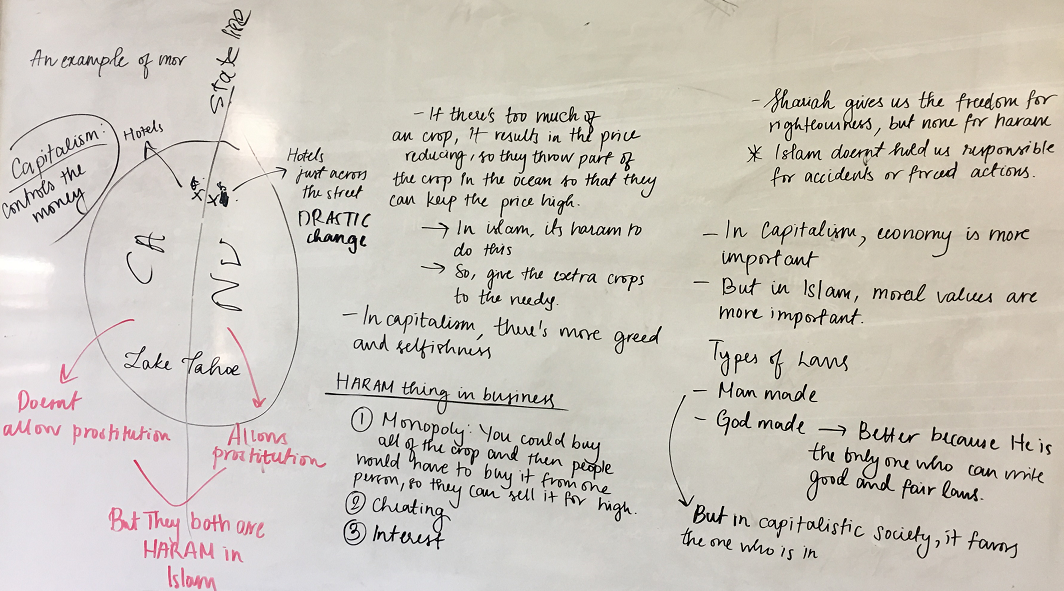
Last
Year Notes:



Lesson
[17] Reply to Hijab Issues.
Defending Islam
against Stereotypes

Click
here to watch the video recording of the class
OR Click here to listen to the audio
recording of the class.
AND
3. Watch the following video about Hijab and use it to as well to answer the questions below as well.
Homework:
Listen
to the audio recording of the class or watch the video, read the notes and
answer the following questions thoroughly. Short answers are not accepted. You
must email me the homework via email hw@zeiny.net
2. What made people say that Hijab is a form of oppression?
3. Is Hijab a Fard?
a. Write and explain the three Ayat that that prove that Hijab is mandatory not an option? The Ayat numbers are 24:31, 33:59 and 24:60.
b. Hijab is a Fard is proven by Ahadeeth. One of them is the Hadeeth of Asma. What is the Hadeeth of Asama when the Prophet SAW saw her without Hijab?
c. Hijab is also proven by continuous practice since the days of the Prophet. Explain.
4. The Nature of women = Feminine side (physical appearance) and professional side (talent).
a. Explain.
b. Which side is for business and which side is for husband family life?
c. Can the Feminine part (Physical appearance) be used for business?
5. Women and girls can be spreading unethical temptations by physical appearance. Explain how?
6. The Shytan uses the physical appearance to generate haram lust. Explain.
7. Why does Islam want to hide the physical appearance? Explain.
8. Some commercials use the body of the women to promote product.
a. They appeal to what attributes of women to promote their products and ideas?
b. Aren’t they lust? Explain.
c. Mention the story and the reply of the Muslim women who was told that why would employers hire you instead of men who have fewer excuses? What was her reply?
9. Because of physical appearance, pretty women may be promoted over talented ones. Explain.
10.How do you reply to the one who says that my talent is my look?
11.Women may be looked at as lust objects.
a. Explain. How
b. What happens when a teacher said that the beautiful secretary is part of the fixed cost of doing business? What was the response of the female students?
c. A pretty woman reporter gets an award. Her male coworkers wanted to put her down. What was the story?
d. An almost naked girl was used for the commercial promoting buying certain kind of bulldozers. What is the relationship between the body of the women and this construction machine? What is the implied message?
12.What is the message communicated in high school culture regarding the physical appearance?
13.There are five lines of defense against adultery or fornication.
a. What are they?
b. Explain why each one of them is necessary?
c. Did Allah say don’t commit adultery or don’t approach adultery. What is the difference
d. Is it possible to avoid adultery if these lines of defense don’t exist? Use the edge of the cliff metaphor.
e. Is it permissible for a man to be alone with a woman in a private place to teach her Quran? Mention the Hadith of the Prophet regarding this.
14.The metaphor “Why buy the cow if you can’t get the milk for free”
a. What is the meaning of this metaphor?
b. In a haram romance, who is the loser? Explain why?
c. In a haram romance, who is taking advantage of the other side, the boy or the girl?
d. Why the divorce causes bankruptcy to men?
e. Why do men prefer to have Haram romance over marriage?
15.An advertisement against haram romance shows a boy and a girl having fun together. Then what happens? Mention the rest of the advertisement. What is the message being sent?
16.When meeting with a marriage prospect, is it necessary that you wear the full Hijab that you wear outside? Why? Mention the Hadith of the Prophet to the ones who were getting married.
Notes:









Lines of defense against adultery or fornication are five:


Lesson
[18]: Reply to “Women are not Equal to Men - Islam allows girls to marry young
- Islam does not allow boys and girls to date before marriage.
Defending Islam
against Stereotypes


Click
here to watch the video recording of the class
OR Click
here to listen to the audio recording of the class.
Homework:
Listen
to the audio recording or watch the video recording of the class, read the
notes below, and answer the following questions thoroughly. Short answers are
not accepted. You must submit your homework via
email hw@zeiny.net
Status of women
before Islam in Early Christianity
1.
What is Misogyny?
2.
Why did early Christianity refer to marriage
as the “filth of marriage”? Get the answer by summarizing http://plainislam.blogspot.com/p/filth-of-marriage-devils-gateway.html
3.
Is the bible Misogynic? Get the answer
by summarizing https://members.bib-arch.org/biblical-archaeology-review/43/2/7. Or Christianity, Religion and Women: Misogyny in the Bible.
4.
Why do the following verses in the
bible be considered as the source of misogyny? Genesis 3:6 to 8. See Sexist Bible Verses
5.
Why do we Muslims consider
verse Genesis 3:9 to be a low
image of Allah?
6.
Read and comment on why women need
freedom from religion
Status of women
before Islam in the world
7. Why
would pre-Islamic Arabs burry their baby daughters alive?
8. In
the pre-Islamic Arabian society, could women inherit or get inherited? Explain.
9. In
the pre-Islamic Arabian society, could women own or be owned? Explain.
10. In
the old Indian Hindu society, what happens to the wife when her husband dies?
Status of women in
Islam
11. Islam
views that the product of a woman is a human being but the product of a man is
much less value. Explain.
12.
What did Islam do to correct the
status of women?
13.
Why would Prophet Mohamed and Islam be
considered revolutionary in women rights at the time?
14.
Was Prophet Mohamed a feminist, like
modern day feminists? Explain why.
15.
Um Salama used to ask the Prophet
Mohamed about women. Allah would respond to her questions directly.
a.
The good deeds for both genders are
equally appreciated [Omran
3:195], [Women 4:124] and [Bees 16:97].
b.
Listing doers of good deeds for both genders [Ahzab
33:35]
Equality versus
Equity
16.Explain the differences between Equity
and Equality? http://sgba-resource.ca/en/concepts/equity/distinguish-between-equity-and-equality/activity-equity-or-equality/
17.Give example of a case where equity is justice and another case where equality is justice.
18. Why men and women not compete together
in the Olympics?
19. Briefly summarize https://everydayfeminism.com/2014/09/equality-is-not-enough/
Islam allows girls to
marry when they are young
20. Difference
between a pregnant teenager in US and Muslim country. Which one is more
descent?
21. The
alternative does not have to be arranged marriage. Explain.
22. Comment
on arranged marriage, independent marriage without any regard to parent’s
opinion and Islam
23. Would
Islam allow a girl to be forced to marry a person without her consent?
24. Why
Islam does not allow boys and girls to date before marriage? Is it moral?
25. Girls
are taken advantage of. How?
26. Explain
the meaning of why buy the cow if you can get the milk for free.
27. In
Muslim countries would a girl would give herself up to a guy without marriage?
Explain why not? Why would this make girls precious?
28. Why
would a girl wear clothes showing her body when it is freezing cold?
29. Islam
wants to make sure that the brains fit together before consummating the
marriage. Explain the recommended stages of getting married in Islam.
30. Consummating
the marriage fast (fast Zawag) is it wise? Why or why
not?
Notes:
Click here for the written notes.
Lesson
[19]: Reply to “Islam Allows Men to have four wives - Women can’t be leaders”.

Reply to: Women can’t be leaders

Benazir Bhutto, former prime minister of Pakistan.

Sheikh Hasina, prime minister of Bangladesh.
Click
here to watch the video recording of the class
OR Click
here to listen to the audio recording of the class.
Homework:
This video is the introductory video
presented in the class.
Listen
to the audio recording or watch the video recording of the class, read the
notes below, and answer the following questions thoroughly. Short answers are
not accepted. You must submit your homework via
email hw@zeiny.net
1. What is justice? Is equality always justice?
2. Are men and women being identical? Are they equal?
3. In the Olympics, do men and women compete together? Why.
4.
Is polygamy allowed in the bible? How many wives the bible say about
Prophets Ibrahim, Yaqob, Dawod
and Soliman?
5. What are the main differences between polygamy allowed by Islam and polygamy allowed by other traditions, such as the bible, the book of Mormon, ...etc.
a. The number is limited to ???
b.
Men are not allowed to marry the followings (women
4:22-23): ???
c.
Justice between wives must be enforced (Women
4:3). If you have
doubts of being just, then???.
d.
What happen to the one who is not
fair when dealing with his wives?
6. What is serial polygamy? How is it related to the subject?
7. Is it illegal to have one wife and unlimited number of girl friends?
8. What if a man caught with another woman that is not his wife, is it a crime?
9. What if a man caught with another woman that is his 2nd wife, is it a crime?
10.Is it illegal for a married man to have a relationship with another married woman?
11.Not allowing man to have multiple wives make women lose their rights. Explain?
12.What are the reasons when have multiple wives is necessary?
13.What is the story of the single woman who converted to Islam in Canada and was lonely?
14.What is the norm regarding having many wives? Whey?
15.Who is more likely to
survive, baby boys or baby girls? Why? Hint see
this. Male Mortality is ??% ???????
than female mortality.
16.Wars take the lives of which gender?
17.Why is it nice to have a co-wife sometimes? What are the advantages of this?
18.What happen to the one who is not fair when dealing with his wives?
19.What are the reasons for which a woman cannot have multiple husbands?
20.What is the Cervix cancer and how is it related to girls who have more than one boyfriend?
Women can’t be leaders
21.Did the US ever have a female president?
22.How would you reply to the ones who say that Islam doesn’t allow women to be leaders?
Notes:
Three set of notes are shown below.
Notes (1):


Notes (2):




Notes (3):



Lesson
[20]: Reply to “Islam Allows Slavery”
Defending Islam
against Stereotypes.

Click
here to watch the video recording of the class
OR Click here to listen to the audio recording of the class.
1.
Introductory
videos
·
Islam and Slavery — Condoned or Condemned?
(9 minutes) By Anne-Marie
Ionescu
2.
Other sources
are:
·
Slavery in Islam (11 minutes).
·
Slavery in Islam Really good, comprehensive and
very intellectual by Professor Jonathan
Brown (1 hour, 52 minutes).
·
Documentary on How Slavery Dominated America (1 hour, 22 minutes).
·
Wikipedia
article. History of slavery in the Muslim world.
Homework:
Listen to the audio recording or watch the video recording of the
class, and read the notes and read this
article in Wikipedia about Islamic Views on Slavery. Then answer the
following questions thoroughly:
1. When Islam came, was
slavery already existing or did Islam introduce it to the society?
a. Is slavery allowed in the
Bible?
b. Were any the founding
fathers in the US were slave owners? Hint describe George Washington’s slave
women and slave children.
c. Is it reasonable to
compare the 6th century Arabia with the 21st century
America?
2. The Islamic slavery was in
no way comparable to the American slavery. Actually, the American slavery can’t
be called slavery because ……?
3. Islam upgraded the status
of slave-master relationship to be closer to employer-employee relationship.
How?
4. Islam has introduced a
tactic to reduce the number of slaves in a Muslim Society. What was this
tactic? Use the metaphor of water tank to explain the tactic.
a. Source of slavery is only
……. ???. Outs are
i.
Killing by accident (Nisa 4:92)
ii.
…???
iii.
…???
iv.
…???
v.
…???
vi.
…???
vii.
... ???
b. It led to the gradual
freeing of slaves. Freeing all slaves at once would create …..?.
5. All Muslim countries paned
slavery at ….???
6. What are the possibilities
in handling prisoners of war? Rank them in terms of best to worst.
a. Free them, but they would
come back to …???
b. Slavery
c. ….???
d. ….???
e. ….???
7.
No prisons in the past to handle
prisoners of war. The slavery is an alternative to prisons. What are the
advantages of slavery over prison?
In prison, they are burden on the society, have to be
….???, have to be …???. In Slavery they work for the …???? and get exposed to
…???.
8. Status pf women slaves
before Islam.
a. Women can be ….???. Islam
upgraded the status of slave women from being a slave-master relationship
closer to a man-wife relationship that slave women are treated like wives (A
concubines is a woman who….?). Once it is pregnant her status upgrades
automatically ….. Most of the Sultans and leaders that ruled the Islamic world
were children of …???.
b. Islam encourages to get
the slave men and women ….???
9. Slave rights:
a. Access to court
b. ….?
c. …?.
d. ….?
e. ….?
f. …?
g. The Prophet saw said about
slaves “Your slaves are your ….???. (Bukhari #2545).
h. The problem is with
Muslims, not with….???.
10.The modern examples of
handling prisoners of war are:
a. Guantanamo Bay
Detention Camp. Compare slavery in Islam to Guantanamo Bay Detention Camp Click here to learn about Guantanamo Bay Detention Camp
from Wikipedia.

b. The modern example of
Bosnia. …???. Systematic
rape as an instrument of ethnic cleansing. ….???.
c. Rape camps happened in
1990s in the middle of Europe that brags about ….
d. Comparing 6th
century Arabia to 21st century America is not reasonable. Why?
11.The old example of African
Americans.
a. Kidnapped
b. …???
c. ….???
d. …???
e. …???
12.(Optional) was Malcolm X? Why his last name is X? Briefly talk about his
impact on civil rights. Use
this link to read more about Malcolm X.
Notes (1):



Notes (2):

Notes (3):

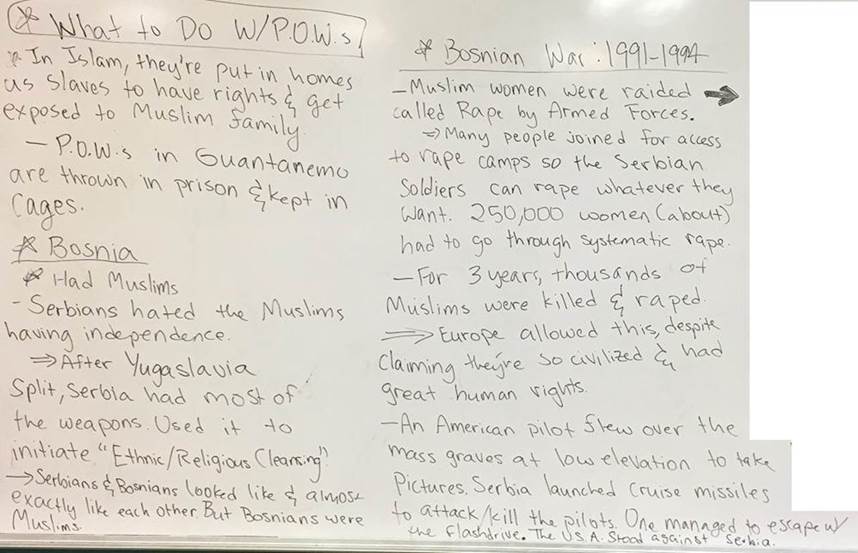


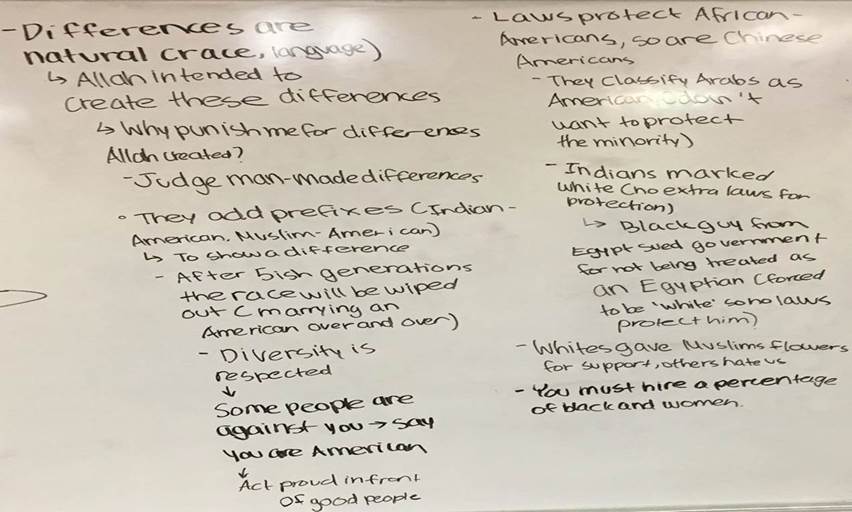

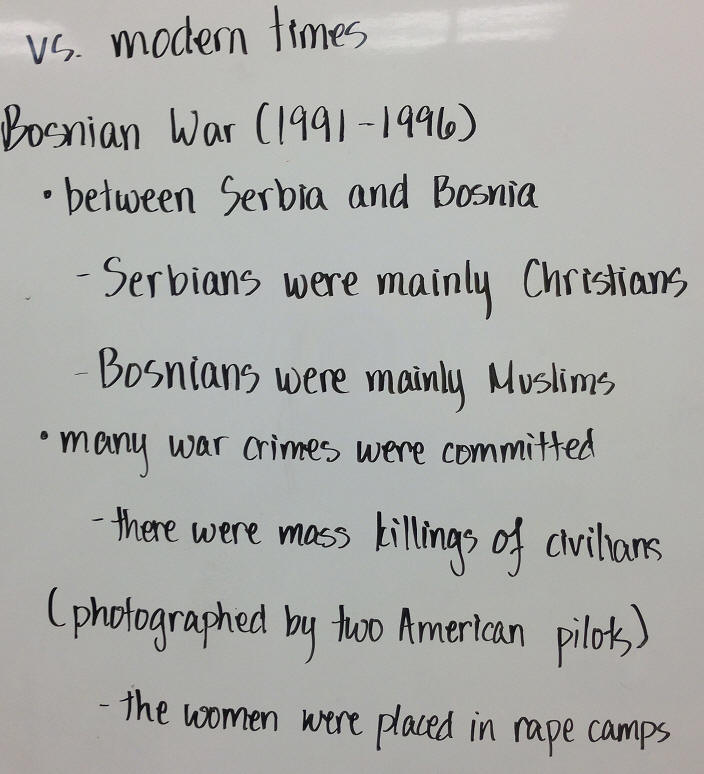

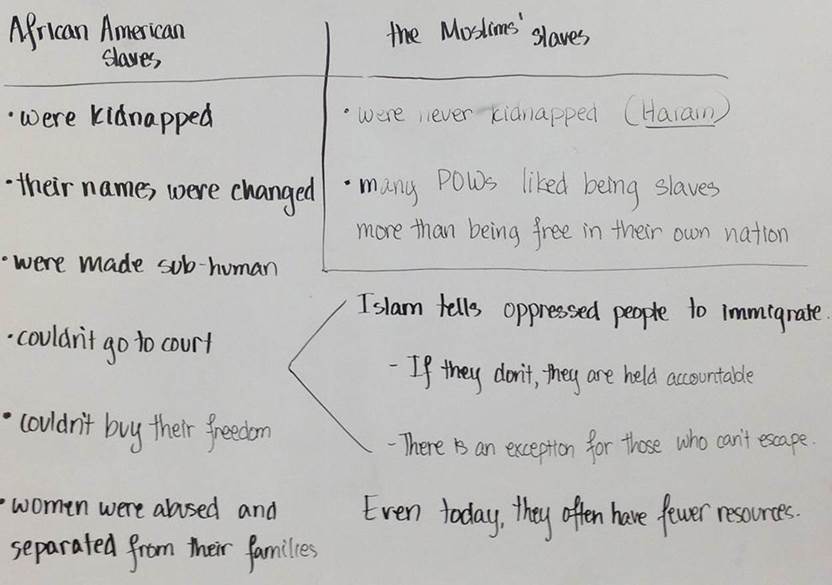
Lesson
[21]: Reply to “Islam is not an American Religion and Mohamed is not an
American Name”
Defending Islam
against Stereotypes.


Click
here to watch the video recording of the class
OR Click here to listen to the audio recording of the class.
Homework:
Listen
to the audio recording or watch the video recording of the class, read the
notes below, and answer the following questions thoroughly. Short answers are not
accepted. You must email me the homework via
email hw@zeiny.net
·
Introductory videos
a. The
Secret History of Muslims in the U.S. https://youtu.be/dPYIdfYfEKM,
b. How the
autobiography of a Muslim slave is challenging an American narrative https://youtu.be/EBQelGvwkhE
1.
What were the birth area of the three
religions? Is Islam the only religion imported from the middle east?
2.
Mohamed is not a Christian name but it is ….
3.
In case of differences between Muslim
American and racist Non-Muslim Americans, the Non-Muslims say go back to your
country. How do you reply to that?
·
I am in ….
4.
Immigrant Muslims accepted to be American
citizens (naturalized)
·
When they were sworn as US Citizens,
they were….. while being aware of it. US born……. citizens …….
5.
In a case of differences between main
stream Americans, they do not say to each other go back to your country. Why?
Do they respect each other’s opinion?
·
They ….. go back to your country.
·
They don’t say that because ….
·
In fact, the true Americans are the …..
6.
Why love it or leave it is not American?
What is the American culture?
7.
You are either with us or with the
terrorists (Bush). You are either with us or you are hypocrite (bin Laden).
Reply to both statements.
8.
What is the difference between propaganda
and journalism (decent media).
9.
The main stream American media insults the
intellectuals because
…..
10.
Natural differences between us …...
11.
Allah judges us for what we choose to be
not what he chose for us. Explain.
12.
Are we democratic or constitutional
republic? Explain the difference between both with examples.
13.
What is the American personality? What is
the Islamic personality? Are they against each other or can coexist?
·
Islamic personality is ….
·
American personality ….
·
They both can .. All over the history,
Christians lived fine in a Muslim land, and the other way around. Muslim …men can
marry …. Quran (5:5).
14.
Explain how the American personality and
the Islamic personality can work together using the concept of pollution.
·
Noise pollution……..
15.
Immigrants are being tested but American
born were not tested. Explain this argument. This argument is a reply to what?
You may use the example of the free pens given in a medical conference.
16.
We don’t want Sharia. We want to ban
Sharia laws. Explain who said that and how do you reply to them.
17.
If the law of the land prohibits Muslims
from praying, fasting, pay Zakah or go to Haj, what
do Muslims do then?
Notes (1):




Notes (2):



Lesson
[22]: Reply to: “Islam is not civilized religion. Muslims are not civilized people”
- [Part I] Analysis of the World’s Modern Civilization – The Book Out of
Control – Global Turmoil.
Are we Civilized
todays?

Click
here to watch the video recording of the class
OR Click
here to listen to the audio recording of the class
Notes: Click
here for notes
Homework:
Listen
to the audio recording or watch the video recording of the class, read the
notes below, and answer the following questions thoroughly. Short answers are
not accepted. You must email me the homework via
email hw@zeiny.net
·
Regarding the century of mega death:
1. Describe five of the most amazing technology we have available to us today.
2. Describe
why the previous century was called the century of mega death. Briefly
summarize the number of people who were killed and the event that cause their
death. How much is the total?
3.
How long communism lived
and how many lives it took?
4.
What is the meaning of
“total war”? Who started and who continued doing it?
5.
What is the meaning of the
technology of death?
6. What is the cause of this mega death?
7. The weapons we have today, how many times they can destroy the world?
8. Who controls the technology of death?
9. Why did not the wars in the past consume even a small fraction of what were killed in the past century?
10.Describe the similarity between a person playing video games and a pilot bombing a city?
11.What is carpet bombing?
· Regarding inequality of the distribution of
wealth and power
1. Describe the global inequality? Compare the wealth of minority to the wealth of majority? Give numbers.
2. Describe the local inequality in the distribution of wealth in the U.S. Give numbers.
3. Describe the global inequality in the distribution of wealth in the world. Give numbers.
4. What was the ratio of the average income of a person in the poor world and the rich world in the eighties and nineties? Is the ratio growing or declining? Use the data published by the united nations human development reports.
· Regarding Hollywood and the entertainment
industry
1. Describe how the television affects the growing mind of the young kids in terms of values, what is right and what is wrong.
2. Mention the data from Nielsen Media Service regarding the hours spent watching television for different kind of people.
3. Why is many of the movies have lots of profanity, brutality, violence and vulgarity? What is the motive behind this?
4. How much is the total export hours of U.S. movies and media as compared to the rest of the world?
5. How many countries imported the television series “Dynasty” and “Dallas”? How bad are they?
6. What are the American movies teach people of other nations about the United States?
7. What are the problems resulting from the characteristics of the current movies and series?
8. (Optional) Many poor people feel miserable when they see the luxury of the rich. What makes this factor worse today than the past?
· Your Judgment
In your opinion what do you think about the current civilization?
What do you think about the technology versus the civilization? Can be
civilized poor people with no technology? Can be uncivilized rich people with
marvelous technology?
Lesson [23]: Reply to: Islam Is Not Civilized Religion -
Muslims Are Not Civilized People - [Part II] Criteria to Measure Civilization.

Click
here to watch the video recording of the class
OR Click here to listen to the audio recording
of the class
Click here for the written
notes.
Homework:
Listen to the
audio recording or watch the video recording of the class, read the notes
below, and answer the following questions thoroughly. Short answers are not
accepted.
The following is
the Islamic criteria to judge civilizations. In 600 words or more, talk about
each criterion and explaining why is it an important criterion and how does it
affect civilization.
1. Highest Value of the society.
2. Source of Legislation.
3. Role of women.
4. Building Unit of the Society.
5. Bases of Unity.
6. Inequalities.
· Your Judgment
In your opinion what do you think about the current civilization?
Notes:
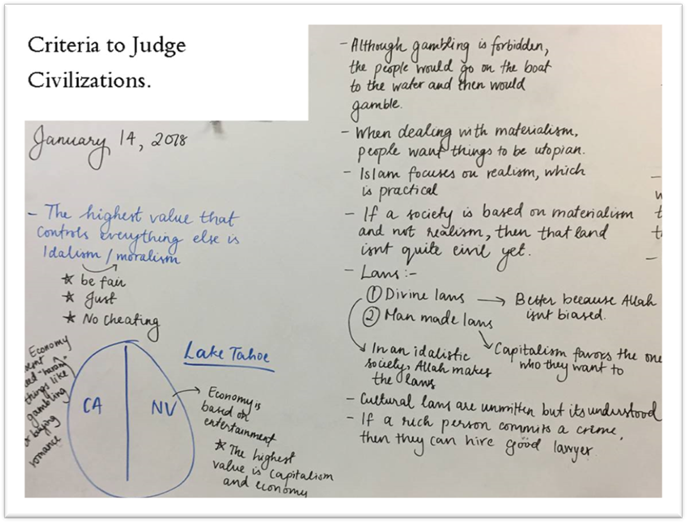
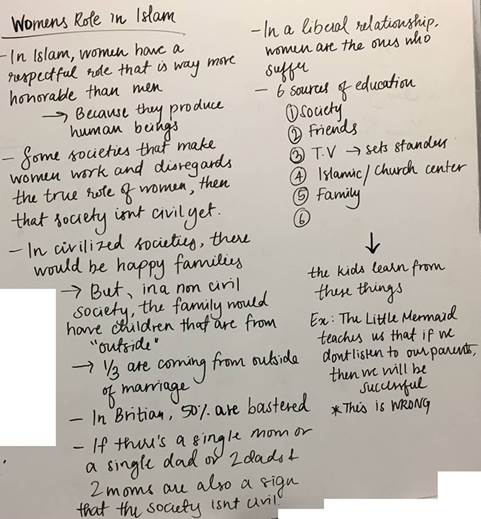
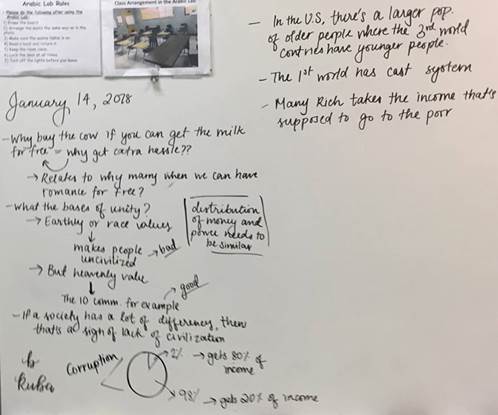
Last Year’s
Notes:
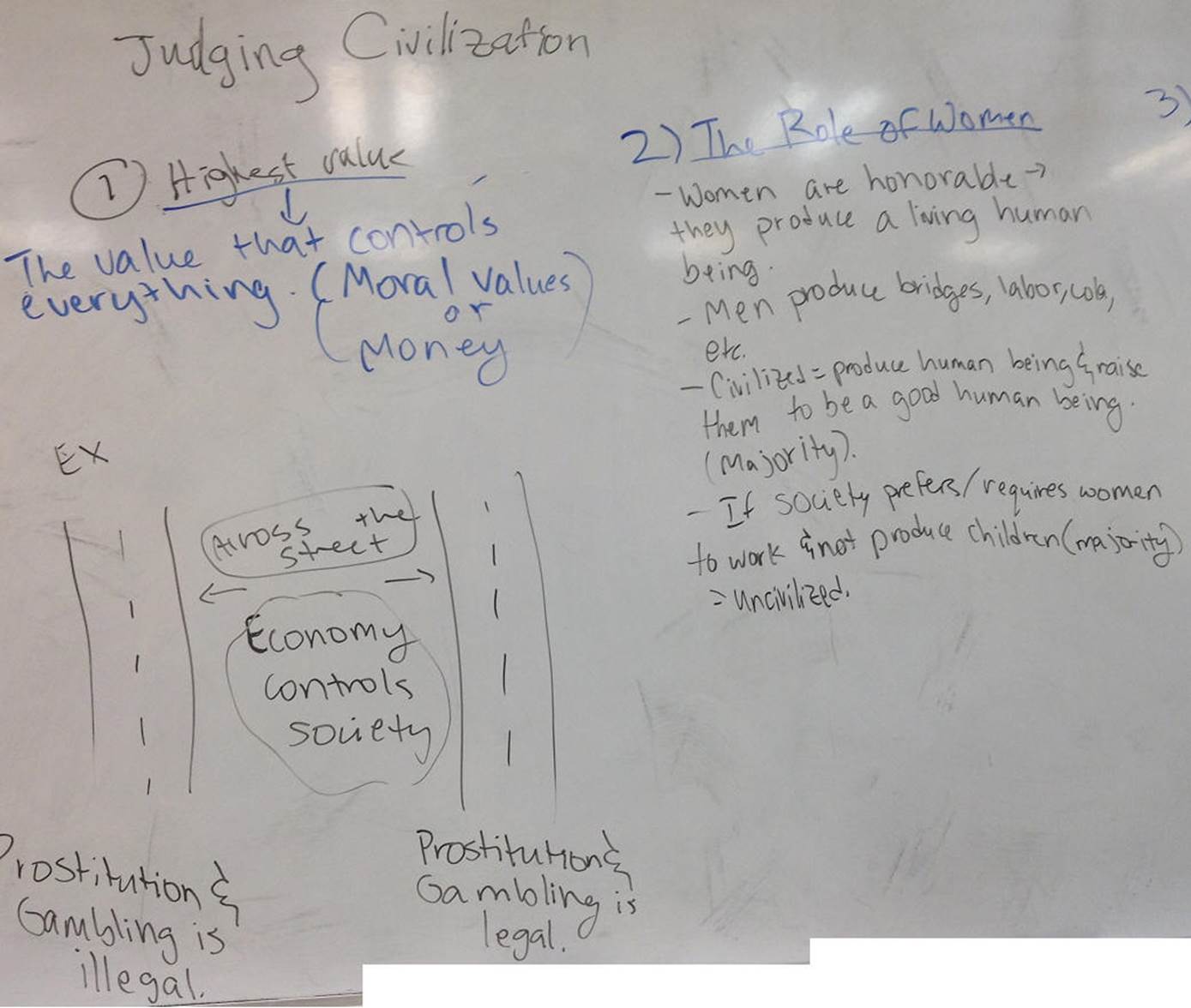

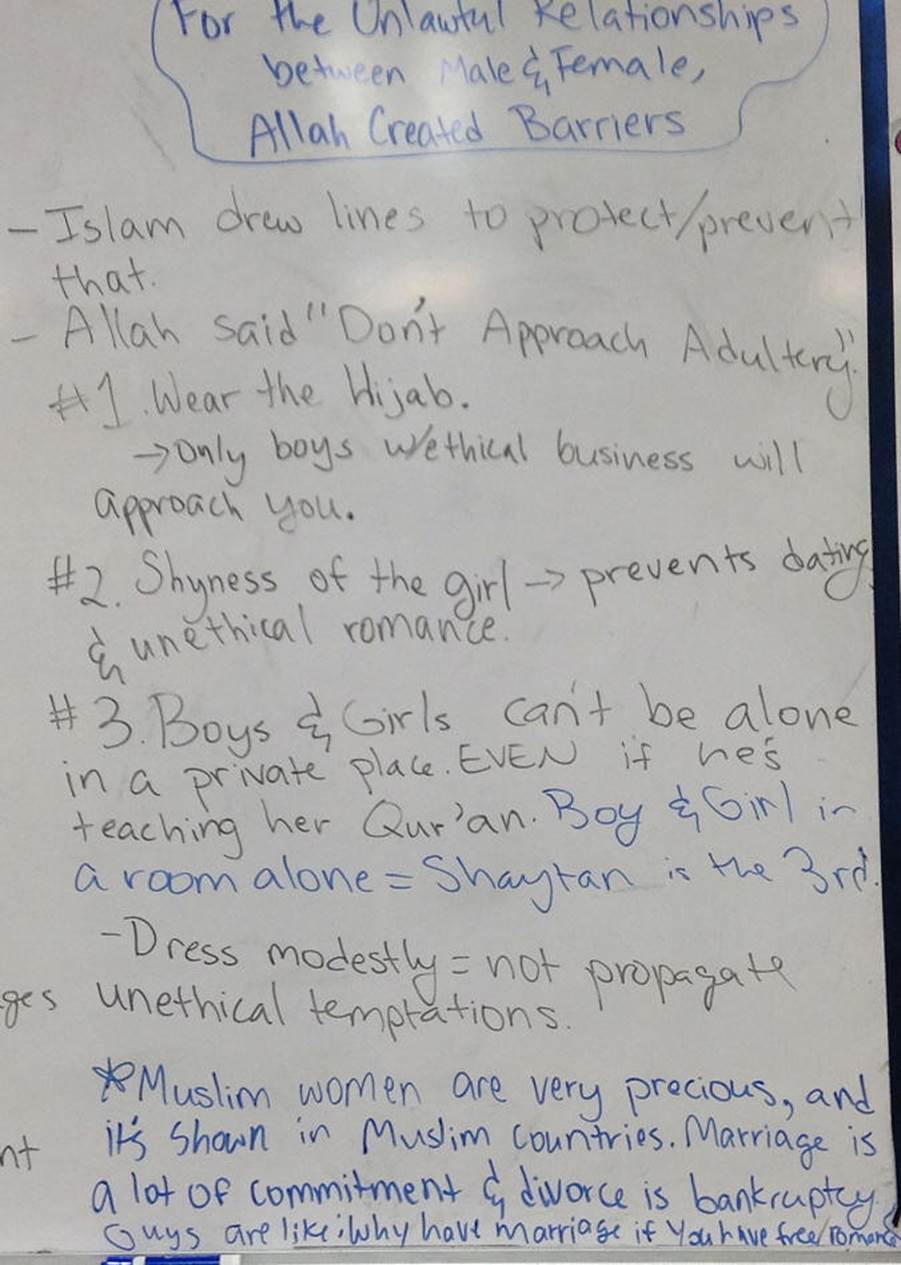


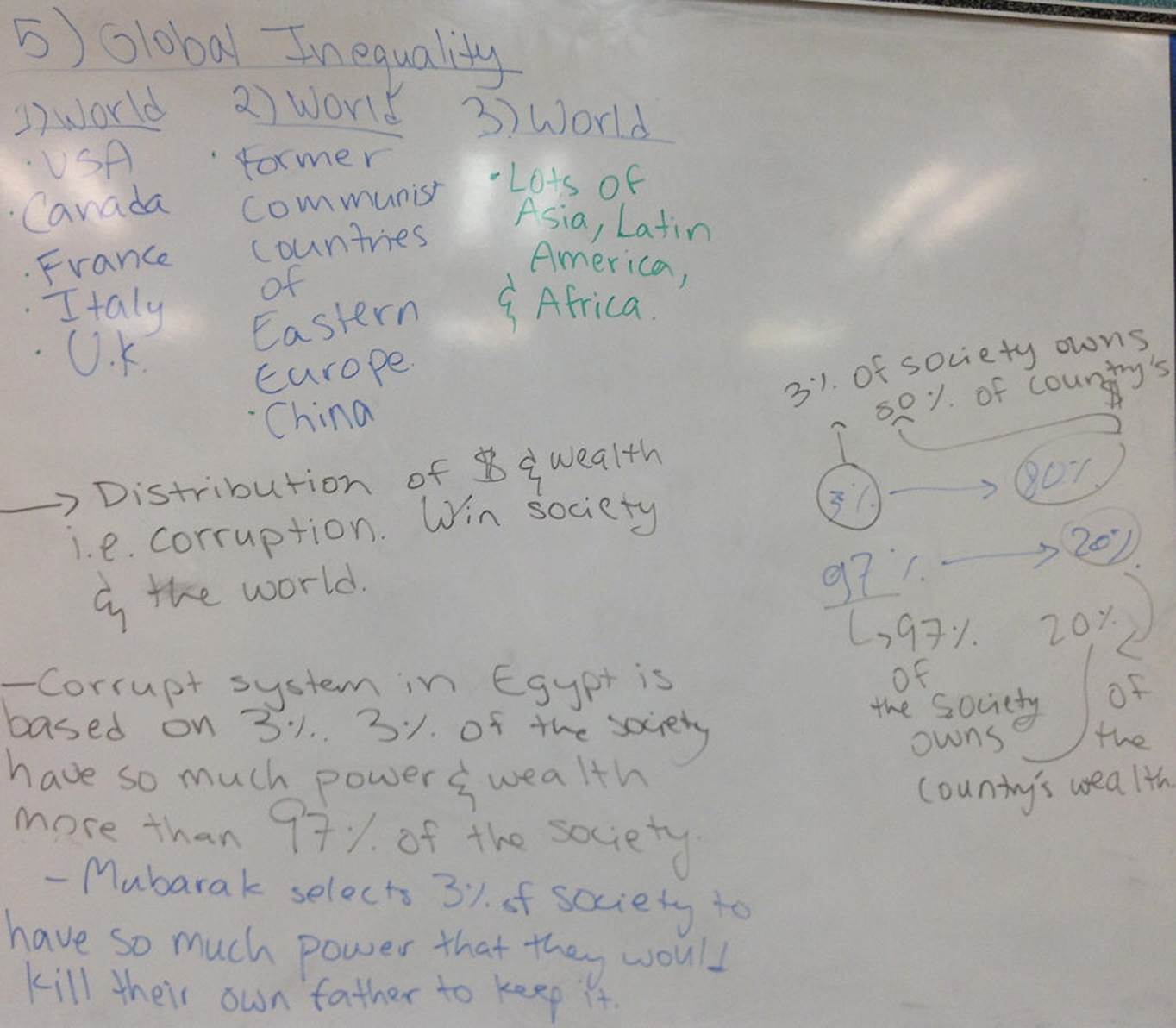
Lesson [24]: Why We are being Tested - The Wisdom of Fitnah and Trials for The
Believer.

·
(Optional) Listen
to this lecturer about Fitnah by Sheikh Dr. Yasir Qadhi
·
Video https://youtu.be/M-YIJpXQm5I 3 major
tests in the Donya (world)
·
Video https://youtu.be/RHdH8LwI1Vs Why
Allah is testing us
·
Click
here to watch the video recording of the class
OR Click here to listen to the
audio recording of the class
·
Click
here for the written notes.
Homework:
Listen to the audio
recording or watch the video recording of the class, read the notes below, and
fill in the blanks.
1.
Linguistic
Meaning of the word Fitnah:
a.
…..
b.
The gold smith is
called ….
2.
Not only we want
to be tested, but we are looking for harder tests:
a.
Dead people ….,
which is a harder test
b.
People who don’t
have freedom ….. is a harder test. With freedom comes …..
c.
Poor people …..,
which is a harder test.
d.
Powerless people
….. With power comes ….. Power increases the circle of …..
3.
Reasons for Fitnahs (tests and trials)
a.
[Ankabot 29:2-4] …..
b.
We all know how
to say … and
read ….
c.
Identification
….on the edge [Haj
22:11]
d. Allah doesn’t like evil but he likes …… evil. Allah doesn’t like Fasad [Baqara 2
:205]…..
e.
People have
different levels of faith….. sort them.
f.
Source of ……
sins.
g.
Raise the ranks
…..
h.
How do you if a fitnah is a relief or a curse?
…..
i.
Allah tests you because he ….. voice
praying to him for …...
j.
The result of the Fitnah will prove to
the slave that he deserves …..en. No F grade without
…..
k.
Love of Allah.
Prophets have the ….. Fitnahs, followed by the …..,
followed by the less …., … The best has . tests than the ….
4.
Types of Fitnah
a.
Testing us
against …. [Forqan 25:20]…..
b.
Tests on
different levels …...
c.
Tests for Muslims
is in …….Rat race for the money. You will be destroyed.
d.
Test of money.
….. [Qasas 28:76-83]……
e.
Tests of the
children of Israel are …..
f.
Tests of
submission …….
g.
Social Media is a
…., video games …...
h.
Fitnah of being a
…..
i.
The test of…..
.things [Anbia 21:35]…..
j.
Soliman and
horses. [Sad
38:31-33]……
k.
The worst kind of
Fitnah is the Fitnah of the ….., i.e., the …... Happens at the end of time but
it exists in a less serious fashion at all times.
l.
Fear, hunger,
shortage ….. [Baqara 2:155-157]…..
5.
Results of
Fitnah:
a.
…. heart.
b. …. stronger
c. The one who accepts the fitnah, …..
d.
Reward to the …. ones.
The reward level is proportional to ….. level.
e. Waiting for the relief with …..is the among the best ….
f. Increase the …. against …. Fitnah.
6.
More facts about
Fitnah:
a.
The Prophet
predicted that this ….. will be …..
b.
Hadith in Muslim.
It is an obligation on every Prophet to worn his followers from …... My Umah will be
tested so much at the …. and will be less tested in...
c.
Never Ask Allah
for …... Always pray for …...
d.
Also, always pray
for protection against ….. such as the ….. of a loved one.
e.
Don’t test yourself
and run away from ……….the lion.
f. You might not be looking for Fitnah, but it …….
g. Seek ways to prevent Fitnah. ……….. is a protection from Fitnah.
h. The Prophet SAW said that worshiping Allah during the time of
Fitnah is like ….. See the ….. suffering hardships around the world. Praying is
very difficult to them.
i.
We should increase our …. of Allah
(SWT). A fitnah is meant to make us
…. During times of fitnah, we should
increase …., our …. prayers, our …, our recitation of the …, and we should race
with one another in doing ….…
j.
The Fitnah is even worse than ….. [Baqara,
2:191], i.e., to cause Fitnah to someone to leave
his religion is worse …..
k. According to the hadith, a time will come when a person will go to
sleep as a …. and wake up as a …. or wake up as a …. and go to sleep as a …..
Why? The reason is that he will sell his
own ….. for the price of this …..
Lesson
[25]: Hadeeth of Intentions
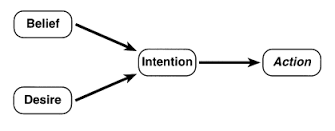

·
Click
here to watch the video recording of the class
OR Click here to listen to
the audio recording of the class
·
The following videos are recommended.
Hadith collections https://youtu.be/I0unMjJ7S0I
Hadith of Intentions https://youtu.be/QnFB4o0F8xU
Story about intentions. A man constructed his new house. https://youtu.be/VVbn381-_ak
Homework:
Listen to the
audio recording or watch the video recording of the class, read the notes
below, and answer the following questions thoroughly. Short answers are not
accepted.
1. Explain why the intention's hadeeth is 1/3 of Islam that the other
2/3 are no good without.
2. Similarity of hearts: How come Allah blamed the Jews who fought
Prophet Mohamed SAW for the mistakes of their predecessors? How is that fair?
3. Many people have evil intentions. Would Allah allow all of them to
do what they intended? Why or why not.
4. Why The intention of the believer is better than his/her deeds and
the deeds of the hypocrite are
better than his/her intentions
5. If you pray Fajr every day and one day you are sick. Would Allah
count the sick day as prayer in the Masjid?
6. You don’t pray Fajr in the Masjid when you are not sick, then do
you get rewarded for praying in the Masjid when you get sick?
7. Why would Allah send believer to Jannah for everlasting life when
they have worshiped Allah for a limited time period?
8. Why would Allah send bad guys to hell for everlasting life when
they have disobeyed Allah for a limited time period?
9. What do you say if someone gives you a compliment?
10.
Are we allowed to judge the
intentions of others? Why or why not.
Mention the story of the companion who killed a pagan guy after he said
Shihada.
11.Do Angels know the intention and write it down?
12.Explain the story of the Shytan and the righteous slave who wanted
to cut a pagan tree.
13.What if someone wanted to do a good deed then he changed his mind?
Explain.
14.What if someone wanted to do a bad deed and then changed his mind
for the following reasons
(a) Fear of Allah. (b) Not
good for health.
15.What if someone wanted to do a bad deed in Makkah and then changed
his mind because it is not good for his health.
16.Situations
where we are not judged for what we do. Are we judged for mistakes, for
forgotten, and for innocent errors?
17.Explain the rule of combining intentions. If someone intends to go to the Masjid to pray and to buy milk on the way back, is this a sincere intention or a bad intention?
18.Can someone intend to go to the Masjid to pray and to show off?
19.Can we combine two good intentions in the same deed?
20.Can we combine bad intentions with good intentions in the same deeds? explain.
21.Guarding the intention. The intention can be spoiled before the deed, during the deed or after the deed. Give examples.
22.Explain the following rules of combining intentions. For examples, going to the Masjid to show off and pray, or going to the Masjid to pray and eat food offered in the Masjid. B+G=? G+G+B+G=? B+G+G+G=? If you know the Hadith that proves your answer, then mention it.
23.Explain
the following statement “never regret a good deed that you did in the past”.
Why?
24.Which intention governs, before, during after?
|
Before Deed |
During Deed |
After Deed |
Final Results |
|
Good |
Good |
Good |
? |
|
Good |
Good |
Bad |
? |
|
Good |
Bad |
Good |
? |
|
Bad |
Good |
Good |
? |
|
Bad |
Bad |
Good |
? |
|
Bad |
Good |
Bad |
? |
|
Good |
Bad |
Bad |
? |
|
Bad |
Bad |
Bad |
? |
Lesson
[26]: Sunah and Bida’a
(Innovations) - Legal and Illegal Changes.
 \
\

·
Click
here to watch the video recording of the class
OR Click here to listen to the audio
recording of the class
·
Click
here for the written notes.
Homework:
Listen
to the audio recording or watch the video recording of the class, read the
notes below, and answer the following questions thoroughly. Short answers are
not accepted. You must email me the homework via
email hw@zeiny.net
1. The
meaning of the word Bid3a
a. What is
the meaning of the word Bid3a in Islam.
b. Can I
put my hands behind my neck during the prayer? Why?
c. Can I
go to the Masjid driving a car instead of riding a camel or horse? Why?
d. Can I
pay my Zakah using a check instead of cash? Why?
2. Pure
sources of Islam
a. Why
did AllahSWT select the Arabs to establish
his religion? Why did he select illiterate ProphetSAW
breaching to illiterate society in the middle of the deserts of Arabia?
b. Why
didn’t AllahSWT select the Roman society
to carry and deliver the message of Islam?
c. Why
didn’t AllahSWT select the Jews of Arabia
to carry and deliver the message of Islam?
3. Mixing
Islam with Philosophy.
a. Can
AllahSWT create a rock that he can’t
carry? What is the proper answer to this question?
b. Who
brought in the philosophy to the Muslim world and what was his intentions?
c. What
is the concept of Unity of Existence defined by Ibn Arabi?
4. The
Bid3as of the Mo3tazila’s deviant group
a. Mention
the Bid3as of the Mo3tazila’s group.
b. Imam Ahmed Ibn Hunbal define Quran as?
c. What is wrong in saying the Quran was created?
d. Who
is the Mo3tazila group? What did they do to make
themselves different than the rest of the Muslims? What was the conflict
between Imam Ahmed Ibn Hunbal and them?
e. What
was the conflict between Imam Ahmed Ibn Hunbal and
the Mo3tazila group regarding the Quran? Why was it so important to stop these
clowns from messing with the Quran or the names of AllahSWT?
f. For
what purpose Imam Ahmed Ibn Hunbal was tortured
beyond imagination for years? They tried
to force him to admit what?
g. What was the argument of Imam Ahmed Ibn Hunbal
against raising the issues of the Quran is the creation of AllahSWT,
AllahSWT has hands, AllahSWT's
eyes, AllahSWT hears, AllahSWT
sees, AllahSWT's rose over the throne, AllahSWT established himself on the throne, ...etc? Do we need to discuss these issues?
h. What did Imam Ahmed Ibn Hunbal define
Quran as?
i.
What is wrong in saying the Quran was
created?
j.
Who is Ummar Ibn
Yasir and what happened to him?
k. About the scholars who didn’t stand up with Imam and defend the
Islamic theology against Mo3tazila’s ideology, Ahmed, what was their excuse and
why did Imam Ahmed reject it?
5. What
are the four Meanings of the word Sunnah in the Islamic terminology.
6. Bid3a
divide the Believers
a. How
does Bid3a divide the Muslims? How did it divide the Christian faith?
b. What
are the differences between Shia Islam and Sunny Islam? What is the name of the
battle that was behind this division? What caused this war and what was the
outcomes?
c. Does
Shia Islam have the same Quran, six pillars of faith and five pillars of
worship?
Pictures of the
Board:
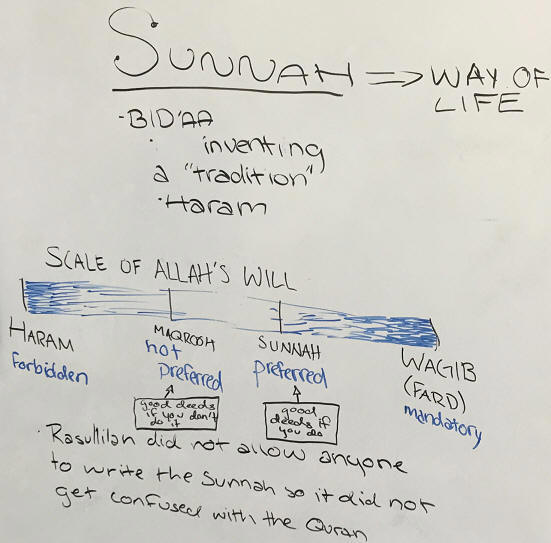
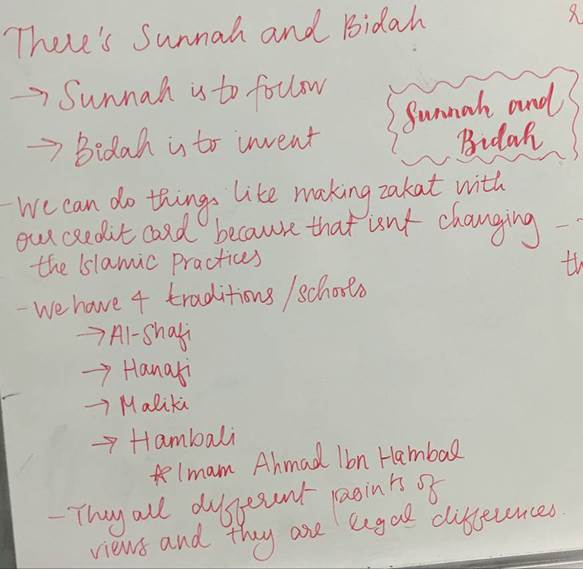
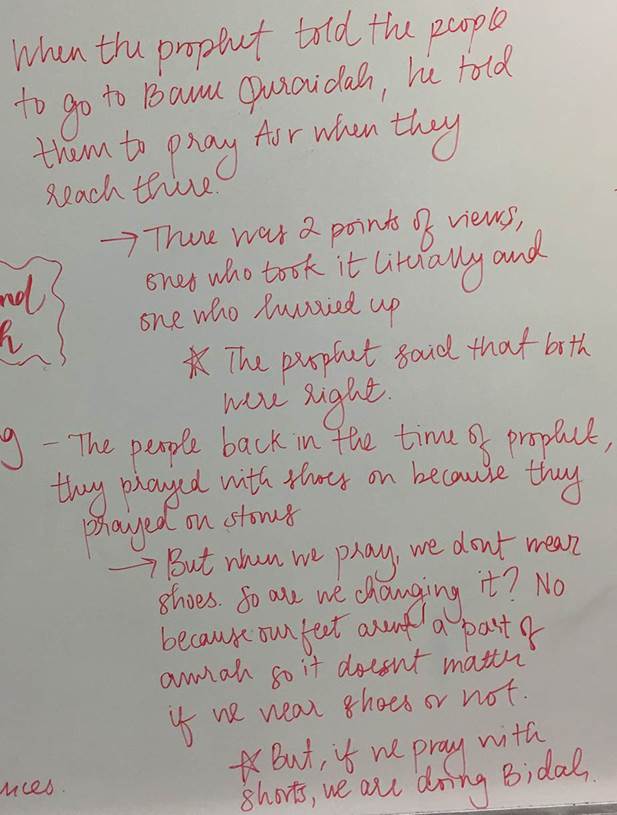
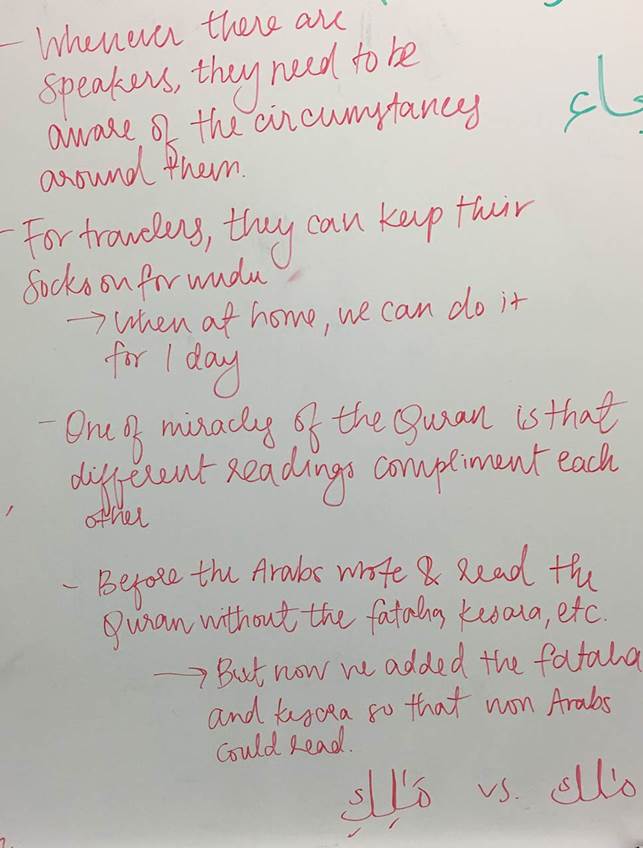
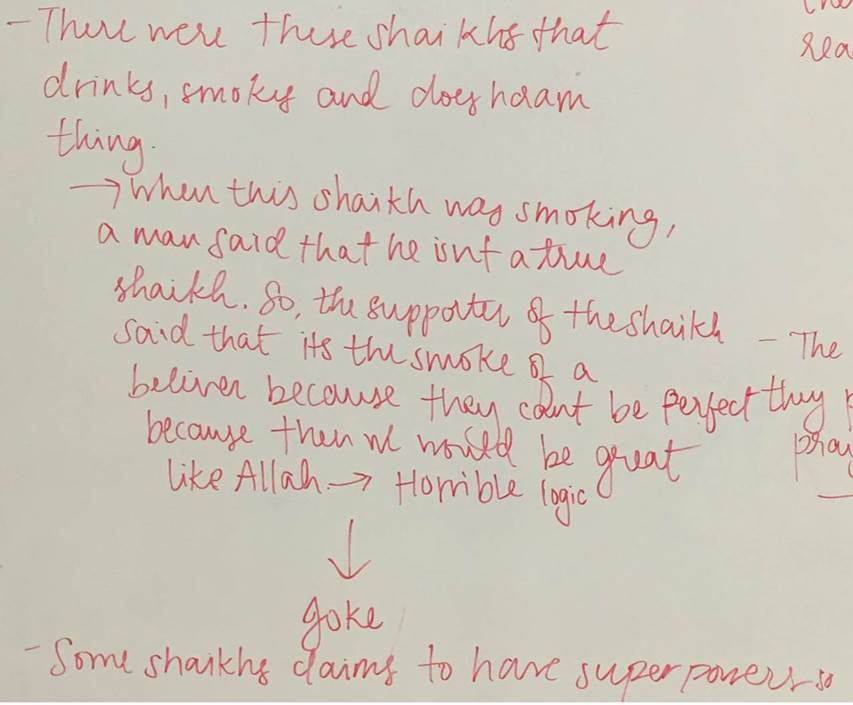
Lesson [27]:
Enjoin Good and Forbid Evil - Speaking Truth to Power


·
Click here to
watch the video recording of the class
OR Click here to listen to the audio recording of the class
·
Speak Truth to Power by Dr./Imam Yasir Qadhi https://youtu.be/X6f0KXg3s9I Time 1:25 to 12:30
·
Click
here for the written notes.
Homework:
Listen
to the audio recording or watch the video recording of the class, read the
notes below, and answer the following questions thoroughly. Short answers are
not accepted. You must email me the homework via
email hw@zeiny.net
1. Who is
the best Martyr in Islam and who is the next best, in relation to speak truth
to power?
2. Briefly
talk about the following three people who spoke truth to power. What was the
story and how did it end? Malcom X, Martin Luther King and Nelson Mandela.
3. About
the Islamic concept of enjoining the good and forbidding the evil,
a.
Is
it mandatory or choice? Quote the evidence from the Quran [3:104]
b.
What
made the Muslim Ummah the best Ummah? Quran [3:110]
4.
About
the Hadith where the Prophet said “Whomsoever among you sees an evil, then let
him/her change it by ….., then ….., then…..“
a.
Mention
the Hadith and what is the basic message of the Hadith.
b.
Is
the use of hands to combat evil open to anyone? Who can use the hands to stop
evil?
c.
Which
method that has been always used by the Prophets?
5. About
the Hadith where the Prophetsaw was
describing to his companions that his Ummah would abandon the obligation of
enjoining the good and forbidding the evil, and does the exact opposite.
a.
Mention
the Hadith and what is the basic message of the Hadith.
6. About
the question “does the punishment from Allah due to committing an evil act,
restricted only to the wrong doers or that everyone would suffer, whether wrong
doers, victims, witnesses, etc.
a. Do we
all get punished, or only the wrong doers among us?
b. Use the illustrative metaphor of
different people traveling in the same ship, to illustrate what would happen if
people would stop enjoin good and forbid evil among themselves.
c.
Quote the evidence from the Quran that punishment coming from
Allah resulting from committing an evil act is not restricted only to the wrong
doers. Surat Al-Anfal (8:25)
d. Mention and explain the Hadith about when Allah sent angel Jibril to destroy a wicked town that had a righteous person (not a reformer) living in it. Would the same happen if that person was a reformer.
Lesson
[]: The Hadeeth Collections: Hadeeth of
Intentions Part I:

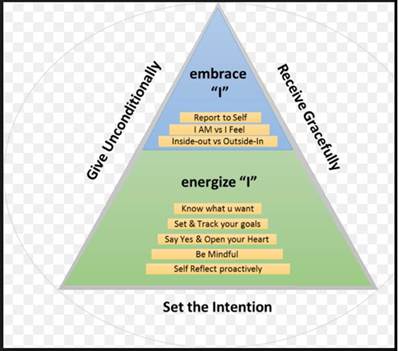
Click here to
listen to the class.
Homework:
Listen to the
audio recording or watch the video recording of the class, read the notes
below, and answer the following questions thoroughly. Short answers are not
accepted. Send me the homework via email hw@zeiny.net
1. Were the Sunnah / Ahadeeth of the Prophet written when he was alive? Why?
2. Talk about the life of Imam Bukhari. You can use this link or your own sources.
3. Explain how Imam Bukhari authenticated the Ahadeeth of the Prophet? Mention the example of the person who cheated the camel?
4. What is the Hadith of intention? Explain the Hadith and mention the story of the guy who wanted to marry Um Qays.
5. Mention the two jokes mentioned in the class regarding intentions?
6. If forty people who did not know each other narrated one Hadeeth, would it be accepted as authentic? Explain.
7. What is the order of the Hadith of intention in the book of Imam Bukhari?
8. Explain why the intention's hadeeth is 1/3 of Islam that the other 2/3 are no good without.
9. Explain how one is rewarded for a deed and the other one is punished for the same exact deed. What is the difference between them that caused one to be rewarded and the other to be punished?
10.Do angels know the intentions? What do they record?
11.Explain the Hadeeth of the four categories of people. Relate them to the intentions.
Notes:
(optional) You may also use
the following document as a reference.
The HADITH - How it was Collected and Compiled.
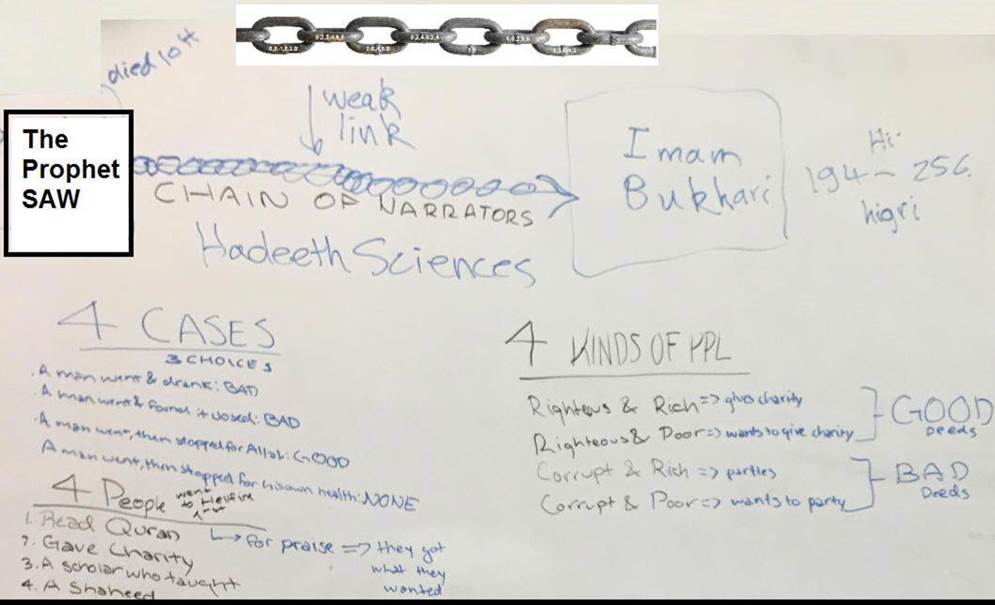

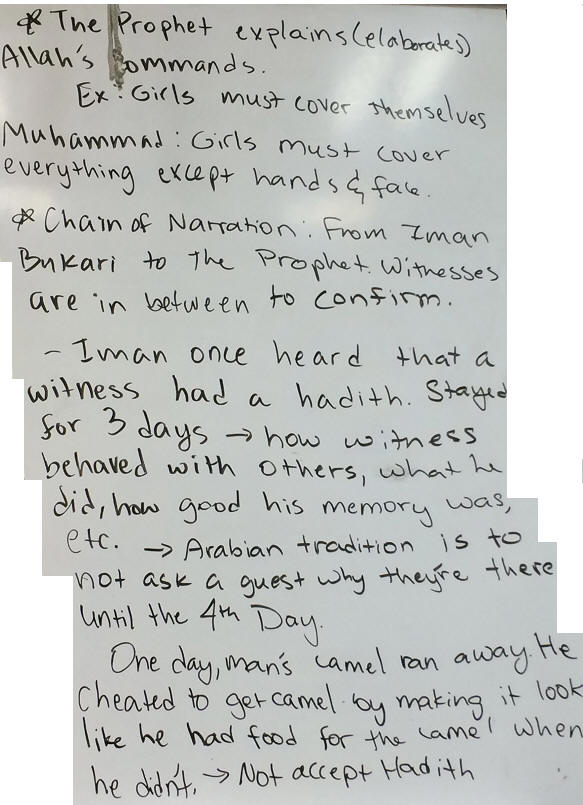

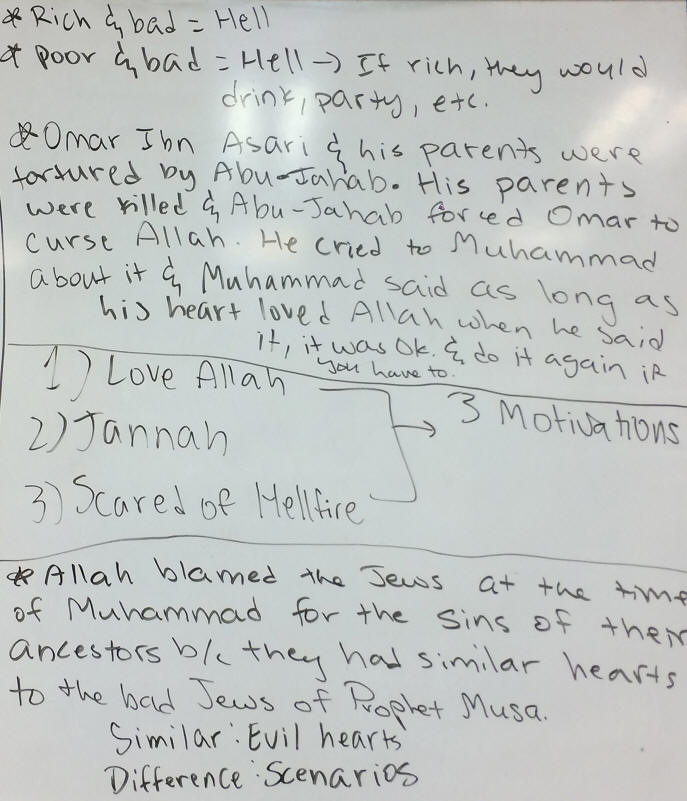
Lesson
[]: Doing Business with Allah

Click
here to listen to the class.
Homework:
Listen
to the class and read the notes, and then in no less that 600 words Answer the
following questions. Short answers are not accepted. Send me the homework via
email hw@zeiny.net
1. Explain how did Allah give you the blessings of body and money
without charging you any money and then he is asking you to give back to him
from that which he gave to you for free.
2. Hasan Al-Basry was once asked why people hate death so much, what
was his answer?
3. What happened if you are deported to a land that you have no
assets or money invested in this land? Compare this when we are deported by the
angel of death.
4. Give five examples of how to do business with Allah.
5. How is doing business with Allah different than doing earthly
business with others?
6. Did Allah ask us to loan him money? Explain.
7. Mention the story of the Sahabi and his garden.
8. The Prophet SAW sweared by Allah that the charity doesn't decrease
the wealth. How is that possible? Give examples.
9. Allah sweared by himself that our shares are predetermined in
heaven. Explain how is this related to the subject.
10. If you don't want many children because you can't afford them.
Explain how is this false?
11. What happened to the disobedient slave who used to say to Allah
"Ya Allah, how many times I disobey you and you never punished me"?
Explain the story.
12. Explain the Hadith when the Prophet SAW asked his companions
"Who is the bankrupt?" what was the answer and how is it related to
the subject?
13. There are recommendations regarding doing business with Allah
related the sources of good deeds, mention one and explain it.
Notes (1):
Click here for the written
notes.

Notes (2):


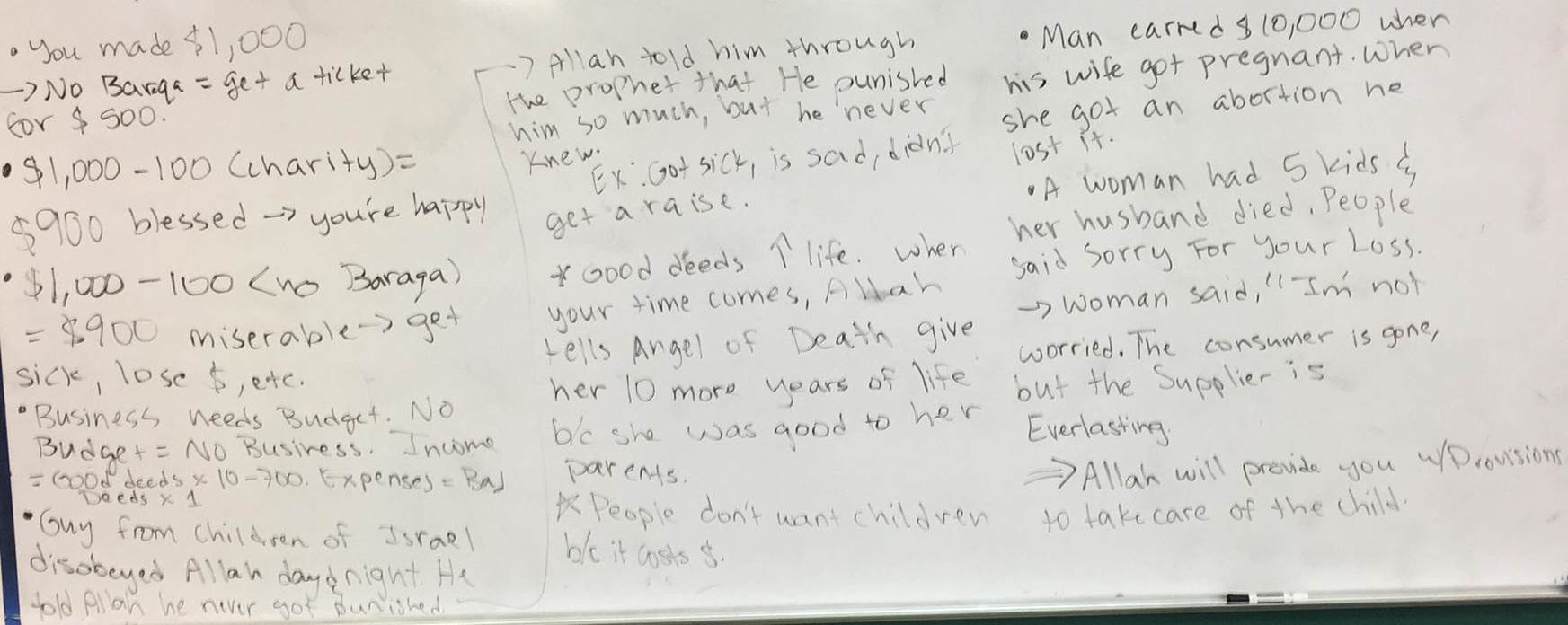
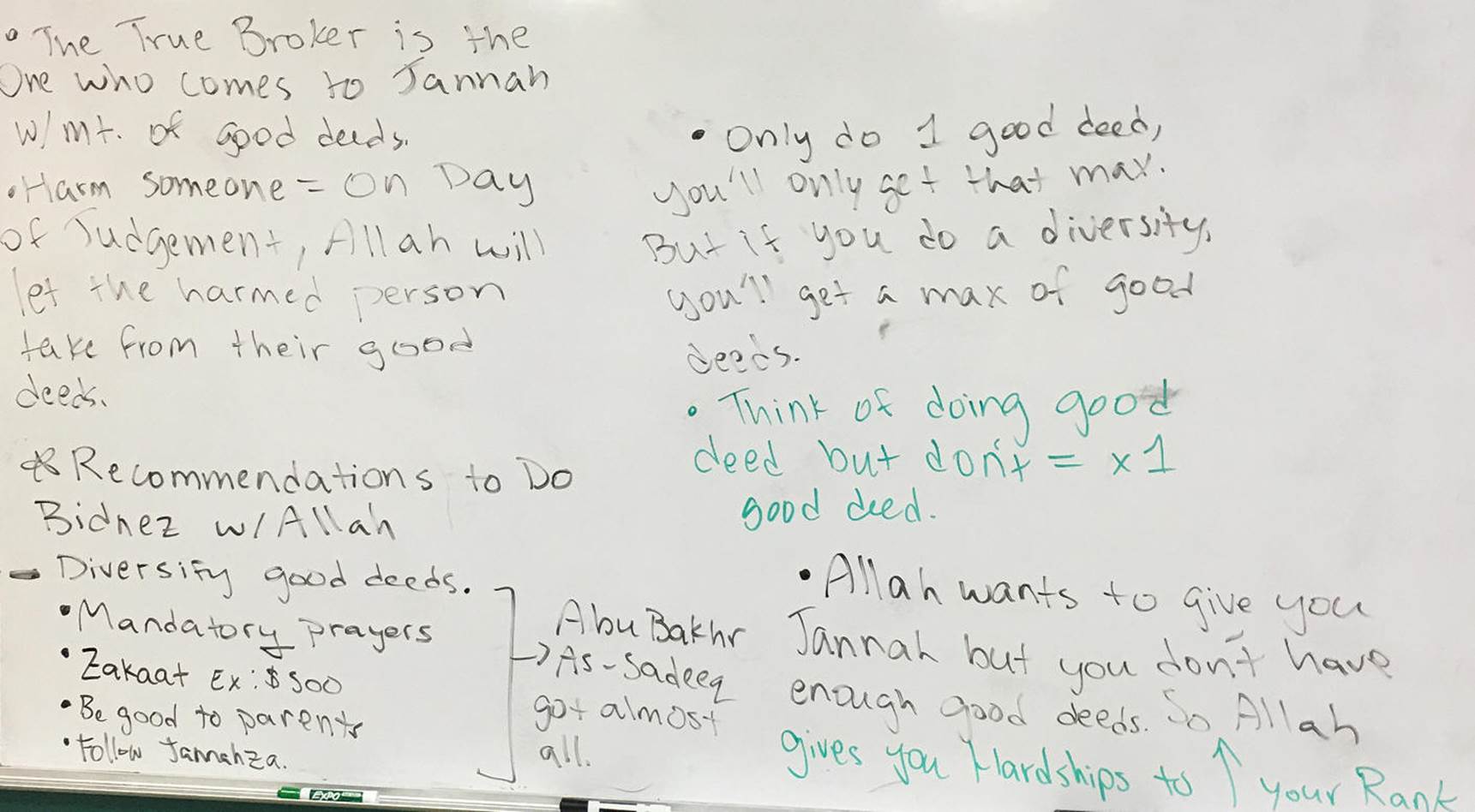
Lesson
[] Lessons from COVID-19 Crisis – By Sheikh Dr. Yasir Qadhi.


Seven Lessons
from the Crises of Coronavirus (COVID-19) by Shaykh Dr. Yasir
Homework:
Listen to the lecture and explain the seven wisdoms that come from
the crisis. Add one of your own.
Lesson
[] The American Dream – By Sheikh Dr. Yasir Qadhi.


Homework:
Listen to the lecture and answers the following questions.
1. Why did Allah describe all the ones who did not answer his call to be people as cattle and worse than cattle.
2. About the pleasure of the stomach and the pleasure of the body:
a. Are they important, not important or don’t matter? Explain your answer.
b. Are they the purpose of life? Describe the kind of the people who say and the ones who say no.
c. Is there a higher purpose of life? Explain.
3. What exactly the American dream.
4. Is really there a higher power, a supreme power or a God?
5. How many people in the world they don’t associate themselves with organized religion?
6. What is the watch maker argument about the existence of God? Explain it.
7. What is the morality arguments argument about the existence of God? Explain it.
8. Do people search for a deity to commit to? Give examples.
9. Let us say there is a God, how do we know that he knows about us and care about us? How do we know that he is a loving God? How do you argue this to others?
10.How do you explain the existence of harm and evil?
11.When the people of Europe and the United States reject religion, are they rejecting Christianity or Islam? Clarify.
12.The glory years of Muslims did they happen in the presence or absence of Islam? Explain.
13.After listening to the lecture, tell me why Islam out of all these religions?
Lesson
[] Surat Al-Baqara 1

Click here to listen to the class.
You can
use Quran Explorer to lookup the mentioned Ayat
Homework:
Read the notes (2
sets of notes), listen to the recording and then in no less than 600 words
Answer the following questions. Short answers are not accepted. Send me the
homework via email hw@zeiny.net
1. What is special about Surat Al-Baqara in terms of length?
2. Where the name of the Surah come from? Mention the story. Mention
the Ayat numbers that talks about the story.
3. How many kinds of guidance we have? What are they? Explain them
and use examples.
4. At the end of Surat Al-Fatiha, who are الضالينAl-Daleen and who are المغضوب
عيلهمAl-Magdoob Alyhm? Give examples of each.
5. Explain the similarity between someone who knows the truth but
don't want to follow it and the one who is trying to lose weight.
6. The Surah speaks about four kinds of people. Who are they and how
many Ayat were assigned for each kind. Mention the
Ayat number.
7. Why the hypocrites were described using more Ayat than the
other two kinds.
8. Why did 1/3 of the Surah dedicated to talk about the Jews who
denied the message of Prophet Mohamed SAW?
9. What do you learn from Ayat (6:20) and (2:75) about the Jews?
10. What is the story mentioned in Ayah (2:89).
11. Why did Allah blame the Jews who denied that Prophet Mohamed is a
Prophet for the mistakes of the early Jews who worshiped the kaaf and killed
the Prophets?
12. Mention the reasons for which the Jews rejected the Prophet SAW
despite the fact that they had detailed description of him in their book. Hint
use Ayah (2:90).
13. Describe the link between Ayah (1:6) in Surat Al-Fatiha and Ayah
(2:2) in Surat Al-Baqra.
14. In Ayah (2:7) Allah said that he sealed the hearts, the ears and
the eyes of the non-believers so that they can't see the truth. How is that
fair? Why didn't Allah open their hearts, ears and eyes instead of sealing
them.
15. What is the story about the last two Ayat in Surat Al-Baqra?.
16. Why does the hypocrites believe that righteous people are idiots?
Mention examples. Hint: you don't know what you are missing.
17. Mention the illustrative examples mentioned about the personality
of the hypocrites. Hint: one is related to the fear of making a commitment and
the other is about plugging their ears.
Notes (1):
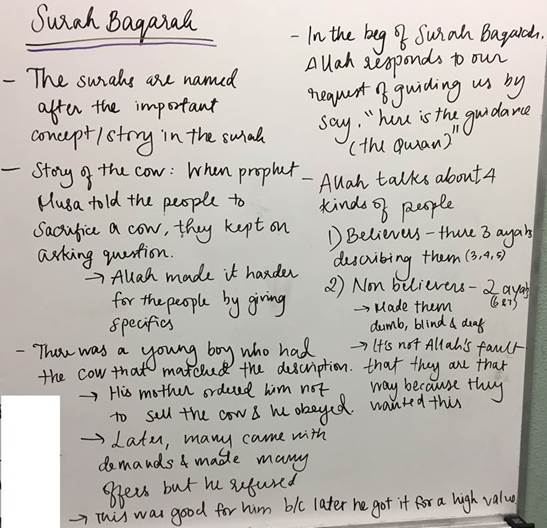
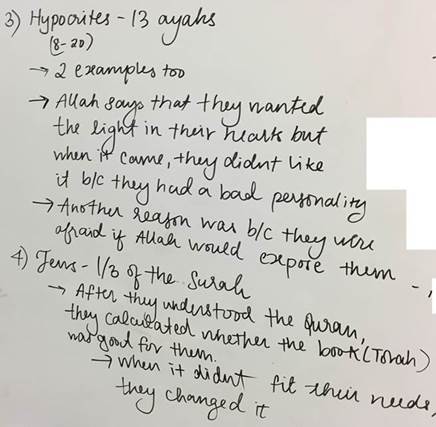
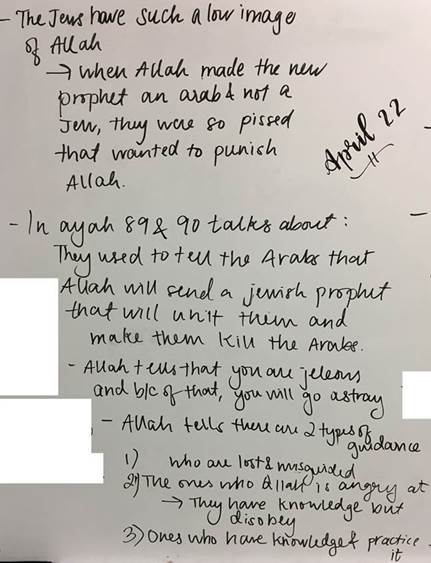
Notes (2):
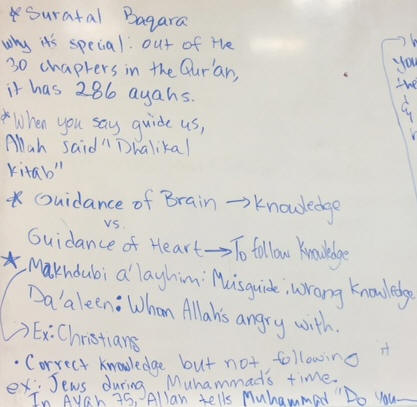
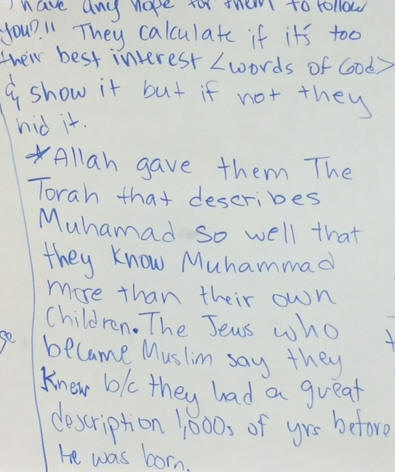
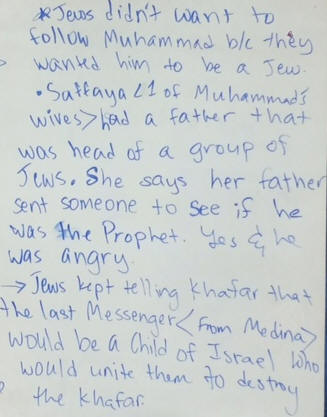
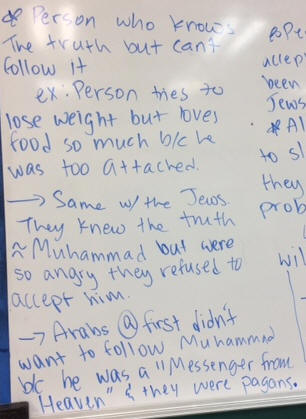
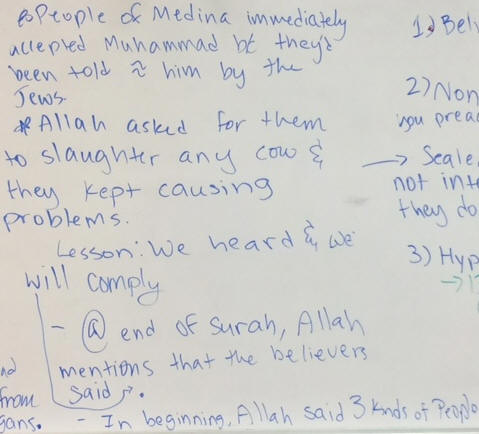
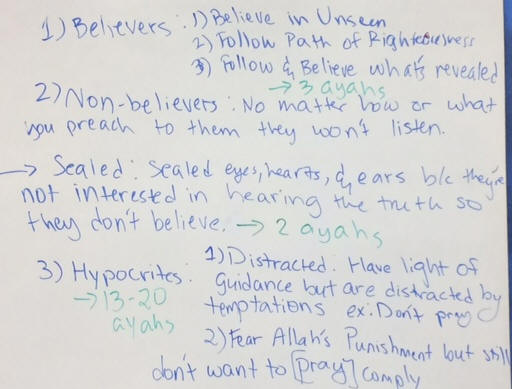
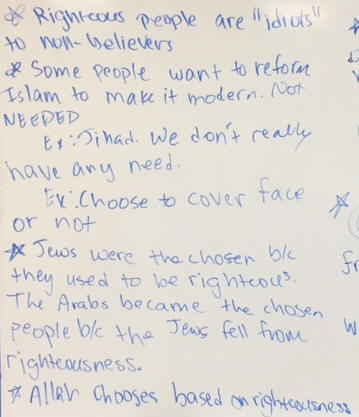
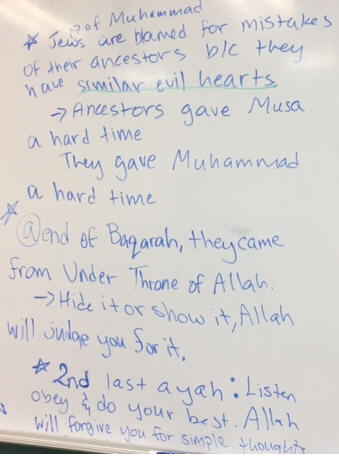
Lesson
[] Surat Al-Baqara 2

Click here to listen to recording of
the class.
You can
use Quran Explorer to lookup the mentioned Ayat
Homework:
Read the notes, listen
to the recording and then in no less than 600 words Answer the following
questions. Short answers are not accepted. Send me the homework via email hw@zeiny.net
1. Explain the story in 2:102, what was the Shytans recite about the
royal powers of Suliman? Who are Haroot and Maroot mentioned in the Ayah?
2. How is black majic done?
3. Before the birth of Prophet Mohamed SAW, could the Shytans sneak
to heaven and listen to the talks of the angels? What happened after the birth
of Prophet Mohamed SAW.
4. What is the nature of Jinn? How can they make themselves visible
to us.
5. How is the Jinn able to bring the thrown of Balqis from Yemen to
Jerusalem?
6. Mention the story of Taloot and Jaloot (Goliath) and how Allah
filtered the army soldiers to weed out the weak ones. Who killed Jaloot? The
story is in 2:246-251.
Notes:
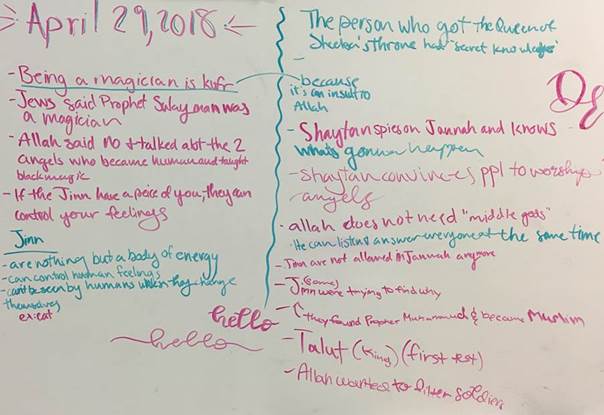
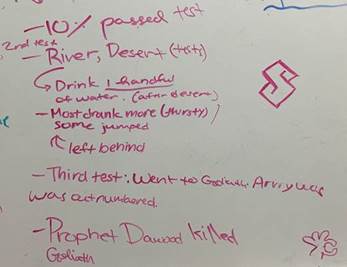
Lesson []: Modern
Challenges – Speech to the Muslim Youth by Dr. Yasir Qadhi.

Dr.
Qadhi

Homework:
Listen to the lecturer by Sheikh Dr. Yasir
Qadhi, and then answer the questions below from the lecture. Be thorough.
No short answers are accepted.
1. What are the differences between the generation of Muslim youth born and raised in America and their parents who immigrated?
2. Why some young Muslims make fun of their immigrant parents? How do you reply to these reasons?
3. Describe the some of the challenges that the early Muslim immigrants in the sixties and seventies had to go through.
4. Why do we have to stand up in support of other victims of injustice by the American government and/or society?
5. What is the meaning of speak truth to power? Do the Muslim youth need to do that? Why?
6. Who is the single greatest American Muslim? What was his position regarding Vietnam war? Why did he take this position?
7. What are our responsibilities as American Muslims?
8. What is the true patriotism? Is it to support America regardless if it is right or wrong? Explain.
9. What do you think about the speech? Provide your own thoughts.
Lesson []: 7
Wisdoms of pain and suffering – Shaikh Dr. Yasir Qadhi

Homework:
Listen to the lecturer by Sheikh Dr. Yasir
Qadhi, and then answer the following question from the lecture. Be thorough.
No short answers are accepted. You can add your own thoughts at the end.
1. What are the seven wisdoms of pain and suffering?
2. What do you think about the speech? Provide your own thoughts.
Lesson []:
– The Day of Judgment [1] (Lecture No. 1). By Shaikh Dr. Yasir Qadhi

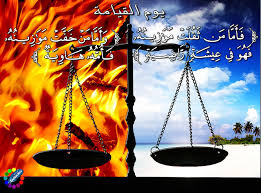
Listen to the lecturer by Sheikh Dr. Yasir
Qadhi and then answer the following question from the lecture. You can add
your own thoughts at the end. Be thorough. No short answers are accepted.
1. This religion is based on three fundamental pillars. What are they?
2. All religions of the world can be divided into two kinds. What are they? Name the religions in each kind.
3. Almost all religions believe in either the Day of Judgment, Karma or reincarnation. Which kind believe in Karma and which religion believe in the Day of Judgement?
4. How is Karma or reincarnation related to the concept of the Day of Judgement?
5. Did the classical early Judaism believe in the Day of Judgment? How about the main stream modern Jews today, what do they believe in?
6. What are the seven techniques (or genres) mentioned in the lecture that Allah used to prove the Day of Judgment? Give examples of each techniques. Make sure your answer is thorough.
7. What are the eight benefits mentioned in the lecture of believing in the Day of Judgement? Make sure your answer is thorough.
8. After listening to the lecturer, what are your thoughts about the subject and the contents?
Lesson []:
– The Day of Judgment [2] (Lecture No. 5). The Plains of Judgment Day. By
Shaikh Dr. Yasir Qadhi


Listen to the lecturer by Sheikh Dr. Yasir
Qadhi and then answer the following question from the lecture. You can add
your own thoughts at the end. Be thorough. No short answers are accepted.
1. The punishment is similar kind to the sin, i.e. same genres. Give five examples of the condition of the bodies at resurrection of the following:
a. The one who constantly asks people and he has no need.
b. Martyrs.
c. The one who was giving Athan.
d. The one who has been drinking alcohol.
2. Regarding cloths at the time of resurrection, people are going to be naked and uncircumcised. Who was the one resurrected first and who is the first one to be clothed?
3. Animals are going to be resurrected. Mention the evidences from the Quran that proves the answer. Why animals are resurrected and what is going to happen to them at the end?
4. Who would wish to be ended like the animals? Why are they making this wish?
5. Who is the one who is resurrected blind? What was his sin and how is it from the same genres as the sin?
6. How long the Day of Judgment? Does everybody have the same perception of how long it is? Explain how?
7. Where is the Hashir (tight gathering) take place, also called Mawqif (موقف)? Which land? Is it in the same earth we have now? Are the skies going to be the same skies we have now?
8. Describe the land of gathering in details, such as color, terrain, size, …etc?
9. How do we find each other in the Day of Judgment?
10.Describe the default condition of the people in the land of gathering in terms of their heads, eyes and hearts/
11.How high the sun above the heads? There are two interpretations, mention both.
12.Due to the closeness of the sum, people will sink in sweat. How high is the sweat and on what basis the height would be decided?
13.Add your own thoughts about the lecture.




